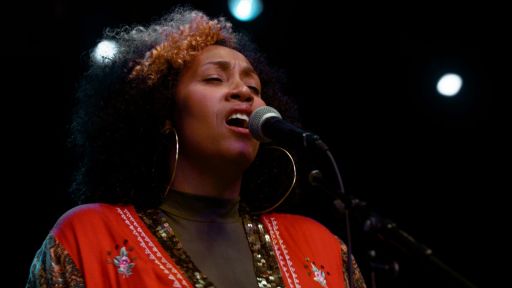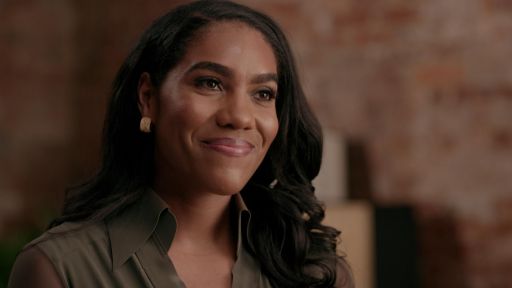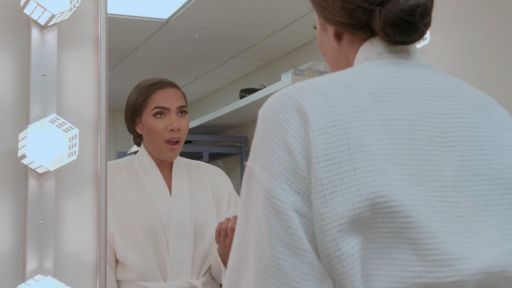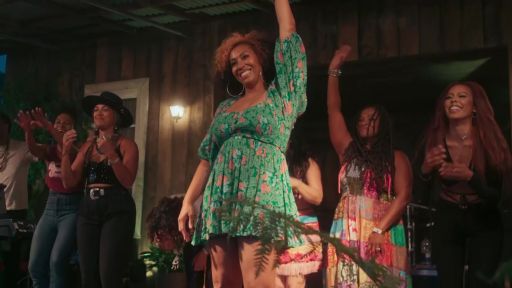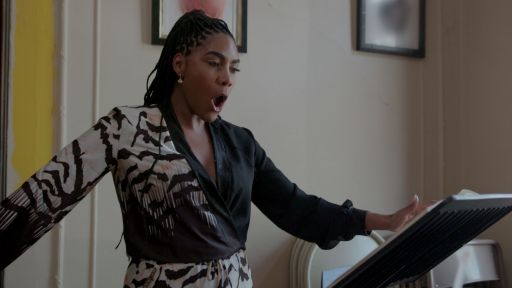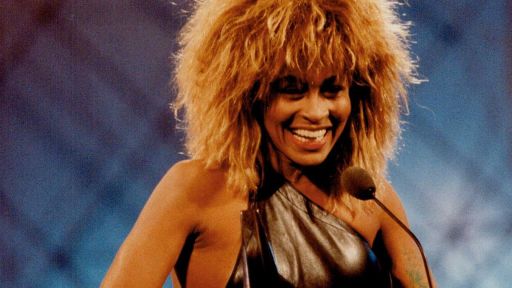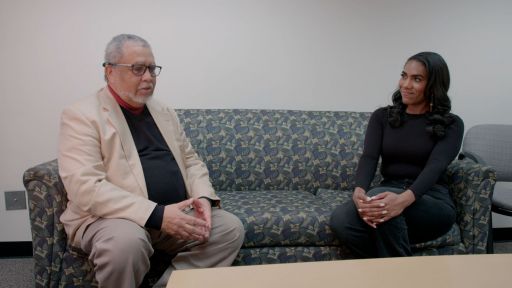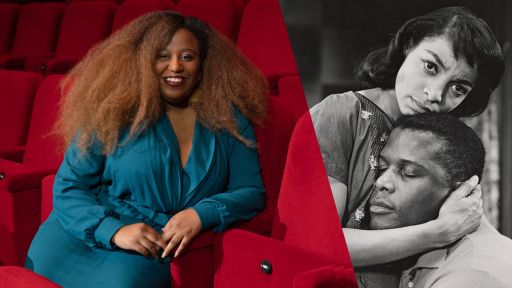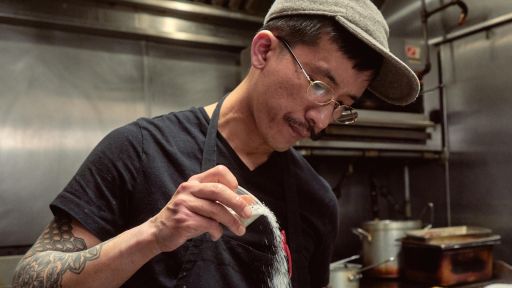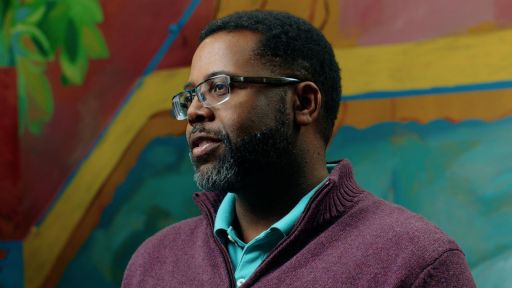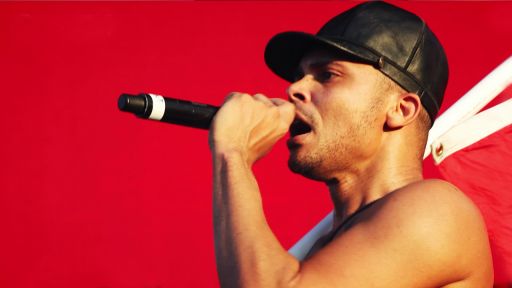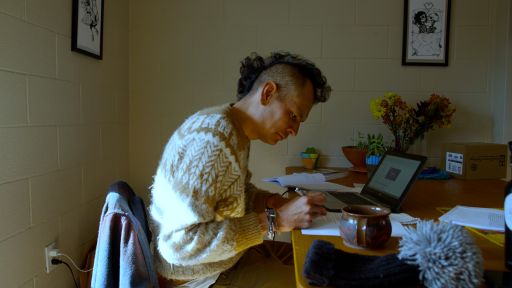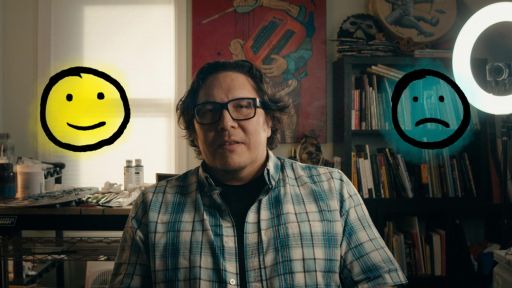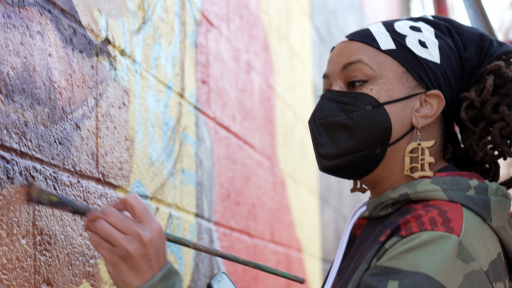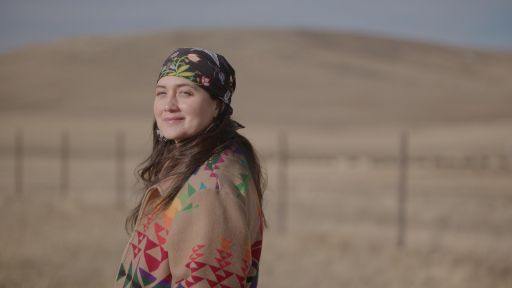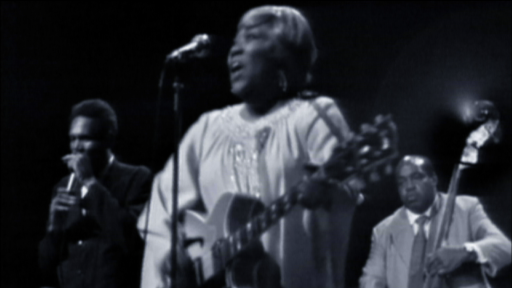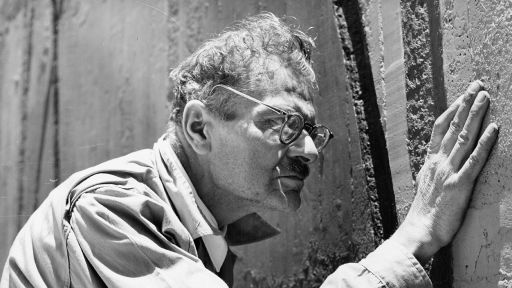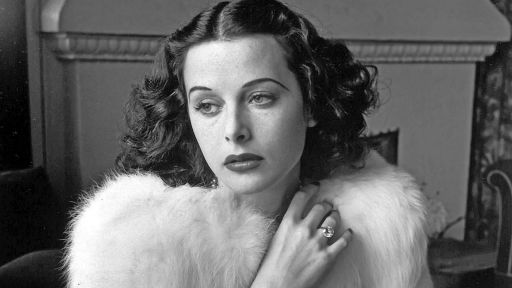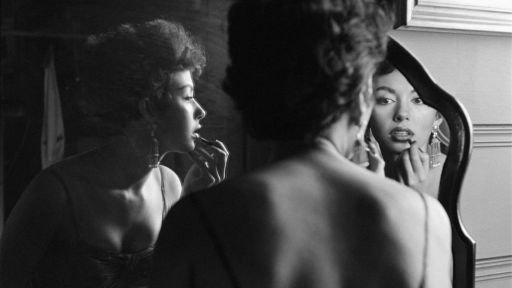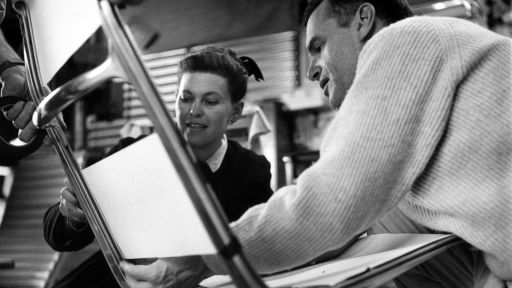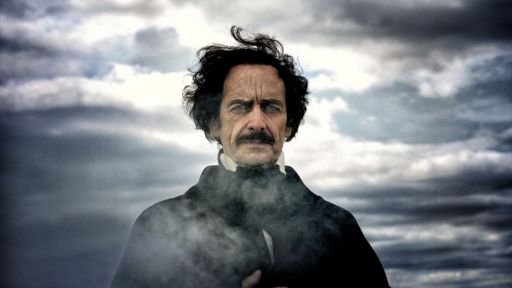ACCESSIBLE TRANSCRIPT [VISUAL DESCRIPTION]
American Masters
In the Making: J’Nai Bridges & Rissi Palmer
Accessible Transcript (Combination)
[Visual and audio descriptions: Mellow music chimes as the PBS logo appears on screen. Jazzy music begins. On-screen text: American Masters. In the Making.]
Narration: Major support for American Masters provided by…
Jo Ann Jenkins, CEO, AARP: These days, we need each other more than ever. That’s why AARP created Community Connections, an online tool to find or create a mutual-aid group, get help, or help those in need. Stay connected with AARP.
[Bold graphic texts displayed, aligned with narration.]
Narration: This program and American Masters are made possible by support from the Corporation for Public Broadcasting. The Rosalind P. Walter Foundation. Sue and Edgar Wachenheim III. Judith and Burton Resnick. Seton J. Melvin. Lillian Goldman Programming Endowment. The Blanche & Irving Laurie Foundation. Koo and Patricia Yuen, committed to bridging cultural differences in our communities. Thea Petschek Iervolino Foundation. The Philip and Janice Levin Foundation. Vital Projects Fund. The Marc Haas Foundation. Ellen and James S. Marcus. The Ambrose Monell Foundation. The Andre and Elizabeth Kertesz Foundation. Additional support for “In the Making” provided by National Endowment for the Arts. arts.gov. Additional funding for J’Nai Bridges: Unamplified provided by Brown Girls Doc Mafia and Future of Film in Female. And by contributions to your PBS station from viewers like you. Thank you.
[Episode begins. Audra McDonald sits in the center frame on stage, a piano behind her.]
Audra McDonald: Hello. I’m Audra McDonald, and welcome to “In the Making,” a new series of documentary films on emerging cultural icons. I remember my first time standing on a Broadway stage. The lights felt too bright, the audience too far away, my stomach in knots. But when the first note came out, the nerves faded away, and I felt the energy of not only those in the room, but those who had stood on the stage before me. This series offers a behind-the-scenes look at tomorrow’s masters in the making. Like me, these artists have inherited rich cultural legacies and are now reimagining them on stage. Two women redefining their craft are J’Nai Bridges and Rissi Palmer. Country music sensation Rissi Palmer has performed on the Grand Ole Opry stage, but she has had to kick down a lot of doors to get there.
[Rissi Palmer sings in a recording studio.]
– ♪ Like a natural one, I’m built to stay, hey ♪
Audra: Through her resilience as a singer, songwriter, and mother, and by lifting up other country musicians of color, Palmer has charted her own path to success on the international stage.
[J’Nai performs at the San Francisco Opera.]
Audra: On the opera stage, mezzo-soprano J’Nai Bridges had just achieved a major milestone, a debut performance at the Metropolitan Opera, when the COVID-19 pandemic shut our stages down.
J’Nai: [Singing opera]
Audra: But as the world also reckoned with the death of George Floyd, J’Nai Bridges reemerged as one of the most significant voices in opera, singing truth to power with a formidable new work. Two women who are masters in the making, breaking barriers and opening doors for other artists not only here, in America, but around the world. This is “In the Making.”
[Screen reads: J’Nai Bridges. Unamplified. Directed and Produced by Christine Turner. A photo of J’Nai singing as she sits at a piano. New scene: Piano instrumentals play as J’Nai is seen sitting in front of a lighted mirror. She inhales steam from a vocal humidifier as she makes a video call on her phone.]
J’Nai: Hello.
J’Nai’s mother on the phone: You ready? You ready?
J’Nai: I’m ready. I’m about to go on in about six minutes, so I just wanted to call you and say I’m ready.
J’Nai’s mother: I love that look. Oh, wow!
J’Nai: Yeah, I’ve not worn this one.
J’Nai’s mother: Let me see it again. Move back. Oh, my goodness. Look at that pink. Your pink lips.
J’Nai: [Laughs]
J’Nai’s mother: You are fabulous!
J’Nai: Thank you! I needed to hear it from my mama.
J’Nai’s mother: Did you do your makeup?
J’Nai: Mm-hmm.
J’Nai’s mother: You did that pink? That pink is gorgeous.
J’Nai: Thank you. I actually have to go. I gotta go. They’re knocking.
J’Nai’s mother: All right, go. Love you! You look gorgeous!
J’Nai: Thank you. Love you, too. Say a prayer for me.
[Music plays in the distance. A poster is seen advertising J’Nai Bridges. Sunday, April 10. J’Nai steps out of her dressing room into the hallway, J’Nai waits to be announced to the stage.]
Announcer: Good afternoon, everybody.
[Vocalizing in distance]
Announcer: My pleasure to welcome you to this exciting event. Those of you who may have been on another planet recently, J’Nai won a Grammy a week ago.
[Cheers and applause as J’Nai smiles.]
Announcer: And now it’s my great pleasure to introduce J’Nai Bridges.
[Applause as J’Nai enters the stage with her pianist. Text on screen: J’Nai Bridges. Unamplified. Whimsical instrumentals play behind an archived video.]
Voice: To a lover of the opera, there is nothing more glamorous or exciting than the opening of the Met. The glitter of the upper strata of society as they dismount from their shiny black chariots, sometimes known as limousines, adds to the air of the electricity that surrounds a formal opening night of grand opera.
[Photos of J’Nai in various performances.]
J’Nai: It’s really an exciting time in opera. There are a lot of new works being done by new voices, especially that are not afraid to tackle difficult subjects. And a lot of our stories have been silenced.
Performing partner: ♪ It’s not the same ♪
J’Nai: There are many Black opera singers and opera singers of color out there, and it’s a matter of creating space.
[New scene: A taxi drives down a residential street in Harlem, New York. J’Nai warms up her vocals in her Brownstone.]
J’Nai: Opera’s incredible. It’s a culmination of every emotion being expressed and poured out [chuckles] through the unamplified voice. For me, it’s my best way of communication.
[Water bubbles as J’Nai vocalizes through a straw in water. She shares the space with her vocal coach.]
Vocal coach: It didn’t– It didn’t quite get to the –
J’Nai: ♪ Mmm ♪ — didn’t get to the small spot. Just go — Just go back and forth, invert the…
[J’Nai sings in a foreign language]
Coach: You know what actually works? I think — ’cause you seemed like you had lot of breath left, and it was the rapidity of the breath in the 16th…
J’Nai: Totally.
[The piano plays as J’Nai continues singing opera. As she sings, she slides down the wall.]
J’Nai: Singing a full opera, which can last anywhere from two hours, an hour and a half — which is on the shorter side — up to six hours, if you’re singing Wagner, for instance, it is much like running a marathon.
[J’Nai is given a handheld contraption.]
Coach: Yep. That’s why I brought that down here.
[The two vocalize.]
Coach: Yeah!
J’Nai: That’s it.
Coach: [Vocalizing] The piano liked it, too, eh? [Laughs]
J’Nai: Yeah, I heard that. I make ugly noises in the practice room, finding what works best with my instrument, with my body, my voice. When you get out on the stage, the goal is for all of that work to come into play and the audience just never know. [Laughs] Ah!
Coach: But this was —
J’Nai: I know.
Coach: That’s okay.
J’Nai: I tried.
Coach: An oak barrel, the slats bursting…
J’Nai: Yeah. Ah!
Coach: …because the water is so much, the slats — you see the slats stretching…
J’Nai: Yes.
Coach: [Vocalizing]
J’Nai: The human voice is very internal. Sometimes that can actually be frustrating [chuckles] because you can’t see what’s going on in there. It’s all based on feeling.
Coach: You wanna try it without a breath and just be like…
J’Nai: Let’s try it.
Coach: …I’m going, I’m going, I’m going, right there? And…
J’Nai: [Opera singing in a foreign language]
Coach: One thing taking away the breath has the advantage of doing is it prevents you from overblowing.
J’Nai: Your emotional state affects the voice. What you put into your body affects the voice, your daily lifestyle. So it’s a very [chuckles] sensitive and demanding instrument. Everything that I do revolves around these two little cords. It’s a very peculiar existence, [laughs] I would say.
[J’Nai is now in her closet, pulling a long black dress off the rack. She puts it back and continues looking through the dresses.]
J’Nai: People always ask me, “What do you do after you wear a gown?” And they’re here. [Laughs] I actually wanted to sell some and give away a few, and I — I still might. Um, but my mom is so funny, and she’s like, “No, we have to save every gown for the archives one day when you have your museum.” So my mom thinks big, [laughs] and I appreciate it. So, yeah, these are, I mean, all of my gowns, and I can think of every performance where I wore them, and it brings back memories, and actually sometimes it’s very emotional.
[Photos of a young J’Nai and family photos appear over chiming instrumentals.]
J’Nai: Singing has always been integral in my life. From a very young age, I can remember Motown in my ears. [Laughs] My parents — they are Motown lovers. I’m from Lakewood, Washington, about 45 minutes south of Seattle. Two parents, three siblings. I fall somewhat in the middle. I’m the third child, so I definitely kind of had middle-child syndrome. [Laughs] My mother is a great appreciator of music, but my dad — I would say I get my musical genes from him. He sings in the church choir actually to this day.
[A clip of a choir singing appears alongside continued childhood photos of J’Nai.]
J’Nai: I grew up in the AME denomination, African Methodist Episcopal, and hymns are a huge part of the service. And hymns are actually very operatic. So this classical sound was always in my ear from a very young age. My first introduction to opera was actually through my late godfather, Dr. Edward Williams, and he used to play classical music all the time in his car. And I didn’t really know what it was that I was listening to, but I knew it was out of this world, unearthly.
♪ Ave Maria ♪
[Footage of a car driving toward the Seattle skyline.]
J’Nai: He took me to my first opera at Seattle Opera. I was very young. I sort of don’t remember the details, but I remember feeling like I was in a different world. And I remember just thinking about it, thinking about this feeling that felt really magical.
[Footage plays from J’Nai performing “Carmen,” San Francisco Opera, 2019.]
– ♪L’amour est un oiseau rebelle♪
♪Que nul ne peut apprivoiser♪
♪Et c’est bien en vain qu’on l’appelle♪
♪S’il lui convient de refuser♪
♪Rien n’y fait menace ou prière♪
♪L’un parle bien l’autre se tait♪
♪Et c’est l’autre que je préfère♪
♪Il n’a rien dit mais il me plaît♪
J’Nai: I can remember wanting to sing “Carmen” since I took my very first voice lesson. [Chuckles] And it’s now one of the staple roles in my repertoire. [Singing in French] I couldn’t have done this 10 years ago because it’s a very vocally demanding role. Also characteristically, it’s quite demanding. I didn’t have enough life in me yet. [Chuckles]
[An article title reads: Opera’s mezzo-soprano blossoms into ‘Carmen’.]
♪Si je t’aime prends garde à toi♪
♪L’amour! L’amour!♪
♪Si tu ne m’aimes pas, si tu ne m’aimes pas, je t’aime♪
J’Nai: Now I’m at a point where I can sing “Carmen” and it’s like, yes! I finally reached, you know, this point. So it’s exciting, evolving into this new dramatic repertoire and unlocking new places and new doors in my voice.
[Text on screen: #AmericanMastersPBS. A new performance: Akhnaten. Metropolitan Opera, 2019.]
Interviewer: This really historic production here — It’s so beautiful to behold this marriage of this staging and this music.
J’Nai: I am channeling every queen with this role. Nefertiti was a big icon in my household. And so making my Met debut in this iconic role feels really just so right.
Interviewer: Some people referred to you as the Beyoncé of opera, playing a legendary queen, but to be sure, there is no other J’Nai Bridges. I mean, you don’t need a — you don’t need another title, as well.
J’Nai: I’d just made my Metropolitan Opera debut. I sang the role of Queen Nefertiti in Philip Glass’ “Akhnaten.”
[More performance footage is shown: “Samson & Delilah,” Washington National Opera, 2020.]
J’Nai: I was in the middle of a run at Washington National Opera singing one of my favorite roles, Delilah in “Samson & Delilah,” in a beautiful new production. We were three shows in, and we had to cancel.
[Music turns suddenly. Photos of empty sidewalks, subway cars, and theaters are shown on screen.]
J’Nai: 2020 was catastrophic [chuckles] on so many levels. And it was just cancellation after cancellation. Financially, it was a huge hit. Every artist immediately felt it. And then I just got really depressed because this thing was not ending. And the murder of George Floyd…
[Footage of protests over the death of George Floyd.]
J’Nai: I just felt… Mm. I felt hopeless, if I’m honest. And I felt like, what am I doing? Like, what — I even questioned singing.
[In black and white footage. At a podium, a Black woman woman addresses a massive crowd. Lighthearted instrumentals play.]
Voice: Genius — Genius draws no color line. Ms. Marian Anderson.
Marian Anderson: ♪ My country ’tis of thee ♪
♪ Sweet land of liberty ♪
J’Nai: I think of the shoulders I stand upon.
[Photos of African American performers.]
All of the African American opera singers that went through so much adversity and brought so many audiences joy and hope and audiences that didn’t like them. Yet they were able to break through those barriers and use their voice.
[Denyce Graves performs on stage.]
– Denyce Graves — [exhales] Denyce Graves really exposed me to the idea that as a Black woman, being an opera singer is possible.
– ♪ Prends garde a toi ♪
– It blew my mind. [Chuckles]
– ♪Prends garde a toi♪
J’Nai: There are many that came before her. I stand on their shoulders, as well. Leontyne Price, Jessye Norman, Kathleen Battle, Florence Quivar. Simon Estes, Shirley Verrett, George Shirley. I mean the list goes on and on. I channel all of them. So when I think of, you know, giving up — it happens rarely, but it does happen [chuckles] — I think of what they’ve gone through and what roads they’ve paved and mapped and what doors they’ve opened so that I can be here today doing what I love. [Plays note]
[Footage of a bustling intersection. The Capitol Building is seen in the background. Elsewhere, a new building: The Music Center at Strathmore. J’Nai plays piano and sings. Sheet music appears on screen briefly.]
J’Nai: ♪ This is my commandment ♪
♪ This is my commandment ♪
♪ You were born dark ♪
♪ On the other side of the sun ♪
♪ They will take no notice ♪
♪ Of your heart ♪
“A Knee on the Neck” is a large choral work surrounding the life of George Floyd and others lost on account of police brutality. The piece was written by Adolphus Hailstork…
[Adolphus Hailstork, composer, is seen on screen.]
Adolphus: They could form a more perfect union.
J’Nai:…with the libretto by Dr. Herbert Martin.
Herbert Martin, Librettist: It was the underpinning of that horror that I was watching being televised.
J’Nai: ♪ Do what they tell you ♪
♪ They are the law ♪
♪ At that moment ♪
♪ Moment, moment ♪
Hmm. It’s hard. There were times when I was learning the piece where I just had to, like, stop singing and cry.
[“A Knee on the Neck” rehearsal: J’Nai sits in a music room with a fellow singer, a maestro, and a pianist.]
Maestro: Should we do four measures? 95? Two, three, and.. [Vocalizing, the pianist begins.]
J’Nai: ♪ This ♪
♪ This is my commandment ♪
♪ This is my commandment ♪
♪ Oh, they ♪
Maestro: Yeah, okay, good. Yeah, so let’s go back so we were a little bit more together.
J’Nai: Okay.
♪ This ♪
♪ This is ♪
Maestro: So yeah. Yeah, so get — Yeah, get off of “this” on three.
J’Nai: Oh, yeah, sorry.
♪ This ♪
♪ This is my comma– ♪
Maestro: Yeah. My, two —
J’Nai: ♪ Command ♪
♪ Commandment ♪
Ay, yi. Okay. I —
Maestro: Well, let’s just take a look at the beginning.
J’Nai: Okay. That’s why we rehearse.
Maestro: By the way, your voice is beautiful.
J’Nai: Oh. Oh, thank you.
Maestro: [Laughs] I mean, I’ve heard it on, you know, media and stuff, but —
J’Nai: Wow. Thank you, Maestro. I think I will stand.
Maestro: If you ever wanna do anything again, let me know.
J’Nai: I feel like I messed up so many times, I got it now.
Maestro: Okay. So let’s go, “in the jail.”
J’Nai: ♪ In the jail I do not know what I will find ♪
♪ This ♪
Maestro: Yeah, yeah, yeah, but — but tempo slowly.
[Both vocalizing]
J’Nai: Oh, I’m rushing it.
Maestro: Yeah, yeah, yeah.
J’Nai: Okay.
Maestro: Sixteenth notes very slow. [Both vocalizing] Yeah, yeah. So for now let’s plow ahead.
[New scene: The Jefferson Memorial is shown on screen. A woman takes pictures of J’Nai with different artists.]
Artist 1: You can take, like, multiple multiples.
J’Nai: Okay, there we go.
Artist 2: Good. You’re good.
J’Nai: So you too.
Artist 2: [Laughs]
Artist 1: Oh, yeah, Russell!
Photographer: I love it.
[Indistinct conversations as artists gather in a capacious room. Text on screen: Young Artists of Washington National Opera.]
Artist 3: When did you know that your artistry was enough? Like, I understand, you know, we have people that are coming and saying all of these different things, but when do you just like, “Okay, this is what I’m gonna do”? And, yeah.
J’Nai: I’ve always known where my strengths lie and where my weaknesses lie. For instance, like, I always knew that singing long lines was one of my strengths. Coloratura, not necessarily. I think you just have to really know yourself [chuckles], and that takes time. But try things, you know. Don’t be afraid to try things.
Artist 1: Why opera specifically? And, like, those moments where you feel like you don’t want to do the art form anymore, what drives you to keep on going, doing this?
J’Nai: Mm. I just see the effect that it has on people. And I really, um, enjoy that, and it makes me feel like I’m making a difference, you know, in somebody’s life and in the world and breaking down, you know, stereotypes and all that. I also just love the challenge of it. And burnout is real. I’ve experienced it. And I really actually didn’t enjoy singing, but it was totally preventable. I mean, a lot of things you just learn by doing and experiencing, but you deserve breaks. [Chuckles] You know? I can confidently say that I have not had a quote/unquote “normal life.” [Laughs] I mean, I watch my friends that I grew up with. They’re all married and they have children and they have a stability in their life that as an opera singer is– is more rare. With relationships, um… I’m single, ready to mingle. [Laughter] Just sayin’. Right now, I don’t have any children, and my career is my baby, you know? So it’s like, right now, it comes first. And it’s not always easy for people to accept that. It’s tough. I’m essentially moving every few months to a new location and making a home wherever I am. Opera singers are truly nomads.
[J’Nai is now in her kitchen with her mother and sister.]
Sister: You’re gonna cook for us.
J’Nai: Yeah, I’m gonna cook. ♪ It’s a little treat ♪
Mother: What is this little pouch of spices?
J’Nai: It’s a pouch of spices and it’s my — it’s my travel pouch. ‘Cause I was like, I can’t keep buying spices. They’re so expensive. You buy it on the road, and then I have all these spices and I have to leave them.
Mother: Mm-hmm.
J’Nai: So I’m figuring out my regimen and, like, what works. But this is actually, like, really cool because I’m always cooking for myself and I’m alone, so it’s nice to have family.
Mother: Well, we love when you cook for us. [Laughter]
Sister: That salmon looks good. A little piece of home. I need to read this about my sister.
J’Nai: Oh, my gosh. What — Guys.
Mother: Don’t make her cry.
Sister: And this is… Ooh, don’t cry. So it says, “In the midst of the worldwide pandemic, she emerged as a leading figure in classical music’s shift toward conversations of inclusion and racial justice in the performing arts.” That’s deep.
J’Nai: All of the panels that I’ve been, you know, a part of…
Mother: Yes.
J’Nai: …concerning diversity, equity, and inclusion that’s happening, it’s always —
Sister: What was the panel that you did?
J’Nai: LA Opera?
Sister: Yes.
J’Nai: Yeah.
Sister: That blew up.
J’Nai: Did you see it?
Sister: Yes.
Mother: It was necessary.
Sister: It was — yeah, I sat and watched it. It was necessary. It was.
J’Nai: It was, and it was kind of scary ’cause I had — I was a little bit fearful, just, like, of being so transparent. I was afraid of retribution, and you just never know.
[Footage and stills of protests are shown on screen. A man reads a statement via Zoom in June 2020. A flier is shown, reading: Lift Every Voice. A conversation hosted by J’Nai Bridges featuring Morris Robinson, Russell Thomas, Karen Slack, Julia Bullock, Lawrence Brownlee. We will begin momentarily. Thank you for joining us.]
Voice: I wanted to begin today with a reiteration of LA Opera’s statement in the wake of unnecessary violence. As a community of believers in the healing powers of art, we acknowledge the longstanding pain and frustration felt by so many, especially those in our Black communities. We stand with them in sorrow and solidarity, opposed to prejudice, violence, devastation, and inequality. J’Nai Bridges, a supremely gifted artist and a leader in the operatic community, had the idea of hosting the discussion today about racial disparity and inequality in opera.
J’Nai: I’ve had these thoughts. I’m singing all over the world, doing what I love, and my people are being murdered every day, lynched publicly.
[Six individuals appear on Zoom.]
J’Nai: I’ll start off by just saying what this is. I mean, I was asked to do a virtual recital by LA Opera and I — as much as I wanted to accept that, I’m just not in a place right now to present in that way. Speaking of our experiences as Black artists in the world comes with something different. It comes with injustices. And that’s not easy for people to hear. It’s uncomfortable to hear about them, and it’s uncomfortable to talk about, but it’s time. It is — It is beyond time.
Russell Thomas: There was something about the image of that white police officer with his knee on that Black man’s neck in the middle of the street.
J’Nai: You know, George Floyd — it could be you, Morris. It could be you, Larry. It could be you, Russell. And it could be us women, as well. [Sighs] As artists and as singers, we are required to bare our souls in front of people, in front of huge audiences, in front of intimate audiences. That requires, um, a huge sense of vulnerability, and so how do you tune out the noise?
Larry Brownlee: It seems like we’re always walking around apologizing for who we are. It’s like we have to be in an environment — environment and try to make everybody comfortable.
Morris Robinson: I’ve never been hired by a Black person. I’ve never been directed by a Black person. I’ve never had a Black CEO of a company. I never had a Black president of the board. I never had a Black conductor. I never had a Black director. I haven’t even had Black stage managers.
J’Nai: Wow.
Morris: None, not ever for 20 years.
Julia Bullock: What have we learned, and why aren’t our arts organizations ahead of the curve, leading this?
J’Nai: I’m tired of having these conversations with you guys. I’m tired of having them at all, but if we’re gonna have them…
Julia: [Laughs]
J’Nai: …why not here? Everybody can just…
Karen Slack: Absolutely.
J’Nai: …just hear us, see us. Do what you want with this information. I hope and pray that it moves you as much as that video did of that cop murdering that man. And so I hope that this — this talk definitely inspires people to make change.
[A New York Times article reads: Opera Can No Longer Ignore Its Race Problem. A New Yorker article reads: Musicians and Composers Respond to a Chaotic Moment. Another New York Times Article reads: Black Artists on How to Change Classical Music. Text on screen reads: #AmericanMastersPBS.]
J’Nai: The conversation was monumental. It almost sparked a reckoning in the opera world and the classical music world at large, about how there are so many underlying issues. I’ve done what I’ve always done, which is use my voice.
[A photo of J’Nai singing in front of a large American flag. Solemn instrumentals play. At The Music Center at Strathmore with Adolphus Hailstork.]
J’Nai: It’s amazing to see you and be with you in person…
Adolphus: Hey, yeah.
J’Nai: …because we’ve been with each other…
Adolphus: Right, right.
J’Nai: …for about two years, actually.
Adolphus: Yeah, yeah, yeah.
J’Nai: Because of the “Tulsa 1921.”
Adolphus: Which you sang magnificently.
J’Nai: Thank you.
Adolphus: Oh, it’s a great premiere.
J’Nai: Adolphus Hailstork — he is a living legend. He’s a composer that has been composing for many years. And he’s finally being given his flowers that have been so long overdue. I’m always asked this question, and I actually don’t know the answer. So does the music or the libretto come first?
Adolphus: The — Herb sent me the libretto.
J’Nai: Okay.
Adolphus: And, uh, it was within a week. I always tell everybody, at least one week passed and — after the murder, and boom, there it was.
J’Nai: Mm. Ooh.
Adolphus: And I said, “Herb, do you want me to set this?” We were both — Everybody was feeling fury who had ever seen the tape. And I said, “Do you want me to set this?” And he said, “Would you, please?”
J’Nai: He’s always been a champion of social justice, and I’m grateful to have worked on two of his pieces now in close collaboration. I’ve learned so much from him. This piece, “A Knee on the Neck” — it — whew! — it’s emotional, you know?
Adolphus: Well, it’s got that big orchestra buildup.
J’Nai: Yes.
Adolphus: And I said, “It’s gotta come. You’ve gotta have a magnificent, mezzo come in on that,” because boom, after all this orchestra build up and trumpets and everything…
J’Nai: Yes.
Adolphus: …suddenly the soloist comes in and says, “This — This is my commandment!” Yes. And wow, you do that. I didn’t know who the final performers would be, but I know I had a dream mezzo in mind, and she’s sitting right here.
J’Nai: [Laughs] Oh, my gosh.
Adolphus: It’s true.
J’Nai: Whatever you need, let me know. You know, I’m really open to that. I’m open to notes.
Adolphus: Well, just the “B” on buttons.
J’Nai: Mm. Okay. Okay. Okay.
Adolphus: If I were to pick out one thing from this morning, the “B” on buttons.
J’Nai: Yeah. Oh, wow. See, I’m glad I asked.
Adolphus: Right! Everything else was wonderful.
J’Nai: ♪ Let goodwill be the buttons on your white shirt ♪ Okay.
Adolphus: Yeah. Listen to that. Listen to that, world. Listen to that.
J’Nai: Oh, gosh. Thank you for trusting me.
Adolphus: Trusting you?
J’Nai: With your music, yes.
Adolphus: You don’t know your stature yet, do you? Or are you getting used to it?
J’Nai: I’m getting used to it, really.
Adolphus: Okay, but —
J’Nai: Yeah, it’s hard for me —
Adolphus: Don’t let it go too much, too up here.
J’Nai: No.
Adolphus: Don’t go to your head.
J’Nai: Yeah, I have to —
Adolphus: Stay as nice as you are. I hope you will.
J’Nai: I will. And I have a great foundation and family and village.
Adolphus: Good.
J’Nai: If I were to get too big-headed they would say, “Um, excuse me, girl. What is — What’s going on? Come back down to Earth.”
Adolphus: That’s good.
J’Nai: Thank you so very much.
Adolphus: Oh, the pleasure’s mine.
[They hug.]
J’Nai: Mm! First of many, the first of many.
Adolphus: I hope so.
[J’Nai is now in the practice room sitting at a piano.]
J’Nai: ♪ Let goodwill be the buttons ♪
Ah! He wanted “buttons.”
Voice on speaker: National Philharmonic, this is your 10-minute call.
J’Nai: 10 minutes. Okay.
Voice: Top of rehearsal, 10 minutes.
J’Nai: Okay.
♪ Let — Let — Let goodwill be the button, button ♪
But-tens? But-tons.
♪ Goodwill be the buttons on your white shirt ♪
Voice: Bridges to stage, please.
J’Nai: ♪ Let goodwill be the buttons on your white shirt ♪
[On stage, the orchestra tunes and warms up. J’Nai walks toward the stage, warming up. Text on screen: A Knee on the Neck. Rehearsal with National Philharmonic.]
J’Nai: ♪ This ♪
♪ This my commandment ♪
♪ Obey, you must obey ♪
Sorry.
♪ You ♪
♪ I do not know what I will find ♪
Secondary singer: ♪ When you go downtown, dress yourself in politeness ♪
J’Nai: ♪ Let goodwill be the buttons on your white shirt ♪
[The orchestra joins J’Nai in rehearsal. Adolphus sits facing the stage from an audience seat.]
J’Nai: So I play the role of a narrator, a mother, warning my child, advising them how to behave and act if you are to be pulled over. The subject matter is, of course, difficult. And I open up the whole work with my voice as a warning to Black men. “Don’t aggravate. Keep calm if you are to be pulled over.” And then you have the choir who plays, like, the conscience of sometimes America as a whole, sometimes as the police. So there are a lot of different voices that ultimately are always in the subconscious of Black people. And I was just exhausted learning the work because it was just like, nobody should have to go through this.
[Footage of J’nai singing in rehearsal. The conductor faces the small audience.]
Conductor: Eugene, we covered an awful lot of ground.
[Tender instrumentals play over a video of J’Nai as a teenager. She sings on a stage, accompanied by a pianist. Additional photos are shown of a young J’Nai.]
J’Nai: My name is J’Nai Bridges, and I will be playing three songs. [Singing operatically] All artists go through phases where we doubt ourselves, we don’t think we’re good enough, we don’t think the sound that we produce is beautiful enough. So all of this stuff is baggage but real- life thoughts. And I think by putting myself out there and having people support me and in my corner and help refine my gifts, it’s really given me the confidence and the assurance that I have today.
[Current day footage of J’Nai performing, then presenting an award to Denyce Graves.]
J’Nai: It is my honor, pleasure, and joy to present to Denyce Graves the 2022 Opera News Award!
[Cheers and applause as Denyce accepts her award.]
J’Nai: And there are still roles that I am not quite ready for that are even bigger. In, you know, 5 to 10 more years, even more repertoire will become available for me.
[Continued footage of J’Nai rehearsing and in performance. Now, J’Nai is seen in the pews of a church.]
Minister: …life and ministry of your daughter J’Nai.
J’Nai: People want to see themselves and feel like their stories are being told.
♪ Here in the quiet ♪
J’Nai: There’s a shift happening.
Fellow performer: You got it.
J’Nai: It’s slow, but I’m hopeful.
[Tender, inspiring instrumentals play. J’Nai looks toward a stage in an empty theater. New scene: A conductor is seen on a full stage for “A Knee on the Neck”, National Philharmonic, 2022. The orchestra plays a grand piece, striking and impactful. ]
J’Nai: ♪ This is my commandment ♪
♪ Obey ♪
♪ You must obey me ♪
♪ They will take no notice ♪
♪ Of your heart ♪
♪ No notice of your heart ♪
♪ Of your heart ♪
J’Nai with choir: ♪ Do what they tell you ♪
♪ They are the law ♪
♪ At that moment ♪
♪ Not what you believe to be true ♪
♪ Not what you believe ♪
J’Nai: ♪ I finally get to the jailhouse ♪
♪ I do not know ♪
♪ What I will find ♪
♪ I do not know ♪
♪ What I will find ♪
Male singer: ♪ When you go downtown ♪
♪ Dress yourself in politeness ♪
J’Nai: ♪ Let good will be the buttons ♪
♪ On your white shirt ♪
J’Nai with choir: ♪ Get there with a lawyer ♪
♪ A lawyer ♪
♪ This ♪
♪ This is my commandment ♪
♪ Commandment ♪
♪ Commandment ♪
J’Nai: ♪ So if we die ♪
♪ We shall die for the iniquities ♪
♪ So if we die ♪
♪ We shall die for the iniquities ♪
J’Nai with choir: ♪ Of those who refuse to celebrate our ♪
♪ Humanity ♪
♪ Humanity ♪
♪ Humanity ♪
♪ To celebrate ♪
♪ Our Humanity ♪
♪ Let the law descent like light ♪
♪ Around our shoulders ♪
♪ For nothing shall leave us ♪
♪ In darkness ♪
♪ Nothing will dispel ♪
♪ Our hope ♪
♪ Our hope ♪
[J’Nai lifts her head, closes her eyes and smiles. Screen cuts to black. Now, text on screen reads: Rissi Palmer. Still here. Directed and produced by Dilsey Davis. Rissi Palmer is seen getting ready in a dressing room backstage. She puts on jewelry, looking into the vanity mirror. She makes her way to the stage.]
Rissi: In 2007, I became the first Black woman in 20 years to be on the Billboard country charts. And to this day, I’m only one of five Black female solo artists to even chart. So if that doesn’t tell you everything that you need to know about the business, then I don’t know what to say.
[Rissi is announced to the stage.]
Announcer: Ladies and gentlemen, welcome to stage Grammy-nominated artist Rissi Palmer.
[Cheers and applause. Rissi plays guitar and sings with her band behind her. Text reads: “Country Girl”.]
– ♪ Hey, hey ♪
♪ You don’t have to be a Georgia peach ♪
♪ From Savannah Beach to say ♪
♪ From Arkansas to appreciate a Southern drawl ♪
♪ Don’t need no kin from West Virginia ♪
♪ To have it in ya ♪
♪ Show the world you’re a country girl ♪
[Text on screen: Rissi Palmer. Still here.]
♪ Ah, ah, ah, ah, oh, oh ♪
♪ See, I’m the kind of girl that says it with a smile ♪
♪ Oh, yeah ♪
♪ That sweet as molasses… ♪
[After the show, Rissi walks back downstairs singing softly to self]
Rissi: After I put out my first independent album, I became an entrepreneur, and it’s a family affair.
[“Country Girl” plays in background. Bryan & Grace Stypmann, Rissi’s family, are seen on screen selling merchandise while Rissi poses with fans and signs autographs. Now, she writes in a notebook in her home. Text on screen: #AmericanMastersPBS.]
Rissi: I am a situational writer… And a second verse. Whether that’s politics, like what’s going on in the world, or, like, what’s happening in the house. And a chorus. Life is what makes me want to write, ’cause it’s so personal to me, and it started out very personal to me as journal entries and poems and that sort of thing. So it’s just kind of always stayed there.
♪ Phone rang at three in the morning ♪
♪ Looked at the screen, it was you ♪
♪ I was sleeping alone in the bed ♪
♪ Wondering, what should I do? ♪
Okay, so this is done. So then…
[She flips through the notebook. Next, the Nashville, Tennessee skyline. Rissi gets ready for the CMT Music Awards Pre-Show in Nashville.]
Rissi: This is the busiest year that I’ve had since the launch of my first album. I have the radio show and other special Color Me Country events. I am a correspondent for CMT.
Interviewer: When you’re not doing all this and playing with our house band, you are on the road yourself. Rissi on the road.
[Rissi is seen in rehearsal.]
Rissi: I am, I am. I just went on tour this year.
♪ Whoo-ooh-ooh, yeah ♪
And I’m a mom. [She answers her phone.] Hi, babies. How are you?
[Now, Shannon Sanders, producer and songwriter, is seen playing piano at the Wirebird Productions Studio in Nashville. Rissi greets Shannon with a hug.]
Rissi: How are you?
Shannon: Hey! Uh-oh. Guitars and everything. Hey.
Rissi: I feel like we should hug, as much as we’ve corresponded.
[Rissi performs “Love on You”.]
♪ More than you find, dear ♪
♪ Is love, love on ya, darlin’ ♪
♪ Let me be the truth ♪
♪ I’m gonna work for you ♪
♪ Boy, let me love on you ♪
♪ ‘Cause that’s what I’ll do ♪
♪ I’m here to be your escape, your getaway ♪
♪ I’m here to love on you, you, you ♪
Shannon: It’s phenomenal what Rissi has been able to accomplish as an independent artist. She doesn’t have to conform to corporate country. She can really lean into her authentic voice, and not only in her singing but in her writing. And I think that that resonates.
Rissi: ♪ Boy, let me love on you, you, you ♪
So much of what we love about country music comes from people of color. And that’s just the truth. The first string bands in this country were enslaved people.
[Early photos of Black people playing banjos, guitars, and fiddles. Acoustic guitar music plays.]
Shannon: Black folks have always made country music. And to be clear, what we call country is really more accurately — it’s more of an East Coast, picking style of the blues.
[Early footage of a Black woman plays acoustic guitar. On screen text: “In the Sweet By and By” performed by Elizabeth Cotten.]
Shannon: Genre was always a construct of labels and radio to be able to divide and to market to different groups of people. It was all American folk music, but they promoted this as hillbilly music. Meanwhile, the music that Black people were making was called race records.
[An advertisement from Race Records.]
Andrew Williams, Author & Journalist: The commercialization of music and this drawing of this color line where Black people do race records and then white people are over here doing this other thing — hillbilly was always set aside as this thing specifically for white people. And so country music, as we fast forward in time, it has grown out of that. And the people that have been put in place generation after generation in these positions of power, whether they’re at country radio stations, at the CMA, at the labels, at the publishers, they are upholding that system. Black people that have succeeded in this industry succeeded in spite of that.
[Rissi sings “Bad Case of the Blues” onstage.]
Rissi: ♪ Ee, ee, ee, ah-ha ♪
We have very complex, sometimes scary, oftentimes very dark, but real history that we need to revise and that we need to be honest about. And so I wanted to contribute to this music that I love so much and to this genre that, you know, I’ve dedicated so much of my life to. I want to make sure that I’m helping and contributing and telling the truth.
[Rissi is seen on stage talking to the audience.]
Rissi: So, hi. [Laughs] I have a show on Apple Music Country called “Color Me Country Radio.” [Cheers and applause] And its named after this album that this next song comes from.
[A photo of “Color me Country” by Linda Martell on vinyl. Black and white photos of Linda Martell.]
Rissi: And Linda Martell is the patron saint of our show. Linda Martell has kind of just been lost to history. She was the first Black woman to ever play the Grand Ole Opry. To this day, she is the highest-charting Black woman on the Billboard country charts. She is kind of the beginning of the question, “Why hasn’t there been a huge Black female country superstar?” This is “Color Me Country Radio,” hosted by Rissi Palmer. Once I started this show, I realized that what I had done was create a safe space that I didn’t have in the beginning of my career.
[Photos of a teenage Rissi.]
Rissi: I was 17 when I met my first managers, Dana Lyons and Leslie Leland, a.k.a. Us Girlz Entertainment. You know, I think people saw me, this little 17-year-old girl, and they’re like, “Oh, pop star.” That’s what their wheelhouse was. I remember we were in a hotel room in New York, and I had my little notebook, and they’re like, “What are you always writing in that notebook?” And I was like, “Just my songs.” And so they said, “Well, why don’t you sing a song for us?” And so I sang this song. It’s called “Please Don’t Call Again.” Terrible song. But I wrote it for Reba McEntire. And they kept looking at each other while I was singing. They’re like…[she furrows her brow.] And Leslie was like, “Rissi, why didn’t you tell us that you like country and that you could sing country music?” And they said, “Rissi, that’s your thing. Like, we’ve been going about this wrong. Like, this is your thing.” And so that was the moment that sparked the change, the transition in our focus.
[Rissi plays “Faith” at a club.]
Announcer: Please welcome Rissi Palmer.
Rissi: ♪ She laid down by the river ♪
♪ And surrendered her tears ♪
♪ Such a sweet little angel ♪
♪ Little too wise for her years ♪
So after several years of trying to break into the Nashville industry, living between Atlanta and Nashville, we decided collectively to move to New York to see if there was a way in that way.
[Rissi plays guitar with Kevin Hunter, musician.]
♪ She’s got faith ♪
♪ And it wraps itself around her ♪
♪ She’s got faith ♪
Nothing. No interest at all. And so I was like, “Well, maybe you’re not good enough. Maybe you’re not writing good enough songs. Maybe you’re not pretty enough.” And so I was, like, stupid thin and working out all the time. Like, I was really hard on myself, like, really, really not good to myself for most of my 20s. Nothing came, for years. I’m getting emotional. Um, I was like, [voice breaking] “Well, clearly you’re not a star. So that’s why… That’s why nothing’s happening for you.” And I remember they used to say that. Like, the girls would say it, and that would just — it just killed me because, again, like, these are the people that are supposed to believe in you.
[Previous footage of a younger Rissi performing, chatting with other women, and professional headshots.]
Rissi: [Sniffles] So it was — it was hard. It was hard for a long time. ♪ The music industry thrives on hungry, naive artists, and I was one of those hungry, naive artists. I jumped out of the frying pan with Us Girlz Entertainment, into the fire. I get a phone call — “I know this guy. He’s based in Atlanta. He wants to meet you.” Terry Johnson was the gentleman, and he had a record label called 1720 Entertainment. So I remember meeting him and him asking me, “What do you want?” I was like, “I want to make music that matters and be famous.” And he was like, “I think I can help you with that.” And so I ended up signing the deal with 1720 and then eventually moved full-time to Nashville, and we worked on this record.
[Rissi’s music video for “Country Girl” from 2007.]
♪ You don’t have to be a Georgia peach ♪
♪ From Savannah Beach to say ♪
♪ From Arkansas to appreciate a Southern drawl ♪
♪ Don’t need no kin from West Virginia ♪
♪ To have it in ya ♪
♪ Show the world you’re a country girl ♪
[Now, Rissi is seen boxing with a coach in news footage. Text on screen: #AmericanMastersPBS.]
Coach: All right, champ, let’s do it.
Reporter: Rissi is the first Black female to fight her way onto the country charts in almost 20 years. Maybe it helps that she boxes to stay in shape.
[Footage of Rissi at her Grand Ole Opry Debut in 2007.]
Announcer: Please make welcome Rissi Palmer, everybody.
[Cheers and applause from audience as Rissi enters the stage.]
Rissi: From that opportunity, I got to play the Grand Ole Opry, which was huge. And my family got to be there with me, which made it even more special. I’m so excited to be here tonight. I stood at the back of this theater almost five years ago, and I said, “One day, I’m gonna play the Opry,” and I’m here tonight. So, thank you. [Cheers and applause] Ooh. You ready? Here we go.
♪ Ladies, if you understand ♪
♪ Let me hear you all clap your hands ♪
♪ If you hear me and you know you’re bad ♪
♪ Let me hear you all clap your hands ♪
♪ Ladies, if you understand ♪
All these good things are happening. And, like, in the background, I was signing documents and not understanding the ramifications of what I was signing. I just trusted blindly and implicitly. So, like, when I was presented with a loan application to sign, I was told that this was for — “Oh, it’s for your record, and it’s for your career. It’s for us to be able to continue to keep funding things. And this is just a formality because we’re gonna pay it back. It’s just that we had to do this in your name.”
[Behind the scenes of the “No Air” music video shoot from 2008.]
Rissi: I was signing my name to contracts that they had worked out through their attorneys, for me, that were more beneficial for them than they were for me.
[Rissi and a large team stand around outdoors on the beach on a sunny day with umbrellas.]
Rissi: So they put you in things. Oh, then they insult you, like, tell you that you’re like Milli Vanilli or that you have a big forehead and the sun’s shining off of it. Yeah, so then you wait and then they set you up. Then they make you stand there and look natural. Hmm. Artistically, I started being told what songs I would record, and I started to feel trapped, like I didn’t have any control over my career or my business, and I decided I wanted to be released from the label. But I was in so deep financially that there was, like… I’d have to sell so many records in order to pay all of that back that it was kind of impossible.
[A document reads: United States Bankruptcy Court, M.D. Tennessee. In re Palmer. 1720 Entertainment LLC, Plaintiff v. Rissi Inez Palmer, Defendant…the court DENIES 1720’s Motion to Dismiss.]
Rissi: The only recourse that I had was to file bankruptcy. And 1720 contested the bankruptcy. And so we had to have a trial. And I ended up winning the court case. I got out of the deal. I was granted a release. I lost my masters. I lost my website.
[Rissi tunes her guitar and strums.]
Rissi: And so all this stuff that I had taken all these years to build…all these years of, like, all the no’s and the rejection and all this stuff, it went away with the filing of paperwork. It was like I hadn’t existed.
Shannon: It would’ve been easy for her to tuck her tail and run after her first experiences in Nashville. It would’ve been really easy for her to abandon her aspirations of being a country music artist or being influential in this country space. But instead, she used it as fuel for her fire.
[Rissi on stage with her band. She performs “Summerville”.]
Rissi: This next song that I want to do for y’all is a song that I wrote about the small town where my mother is from. And Summerville is in the mountains, and it’s just a really awesome place. And my great-grandmother lived in a house that my grandmother was born in and my mother was born in. Unfortunately, I’ve lost my grandmother, my great-grandmother, and my mother since then. But they’re the reason why I’m standing here today. And so I wanted to write this song and do this song for them.
♪ Running barefooted through the summertime ♪
♪ White sheet drying on that old clothesline ♪
♪ You’d say, “Child, wash your feet ♪
♪ Before you come inside to eat” ♪
♪ I’d show up at the start of June ♪
♪ August always came too soon ♪
♪ As we’d pull away in our four-door ♪
♪ You’d stand crying on your front porch ♪
♪ Oh-ahh-oh-oh ♪
♪ Highland Avenue ♪
♪ Ooh-ooh-ooh-ooh ♪
♪ I left too soon ♪
[Rissi walks through a hallway at home.]
I know. I hear you. I hear you. Hey, bud. Hey. Hi. What’s up?
[Rissi picks up her toddler from a crib.]
[Laughs] Hi. I think the biggest thing that I’ve learned from motherhood and career is that there is no such thing as having it all. And anybody that tells you that is a liar. Good morning. Something always suffers. And so it’s either, like, I’m super present with my girls, but, like, work is — I’m not writing, I’m not really focused on the show, or vice versa. Like, I’m on it and I’m just, like, sucking at this whole adulting and mothering and wifing thing. You know, I have to try every day to take the pressure off of myself, that there is no such thing as perfect. There is no perfect mom. There is no perfect artist. And I’m trying to give everything the respect and time and space that it needs so that I can give an honest assessment through song.
[Rissi plays for her songwriting partner, Deanna Walker, via Zoom.]
♪ Till I was your mother ♪
♪ Your mother, oh ♪
My mother died of colon cancer when I was 7 years old and she was only 38. Yeah. Okay. So the idea is, I’ve been thinking a lot about my mom. I just — I wish I knew her, like, as a human. I wish I knew her, like, as a friend. Like, I wish I could say, like, “Were there things that you gave up to have me, and what were they?”
Deanna: All the things that you want to know about your mother are the things that probably your kids would want to know about you. Like, unfulfilled dreams, and, like, what did you give up to have them? And —
Rissi: I can’t really 100% go for it because, like, to really go for it is to be gone all the time…
Deanna: Yes.
Rissi: …and to be working all the time.
Deanna: So what type of mother do you want to be?
Rissi: I mean, I want to be — I want to be their mom. Like, I want to be here. I want to see the stuff. Like, that’s really important to me ’cause I didn’t have that from my mother.
Deanna: Yeah.
Rissi: So I want them to have it.
Deanna: That’s totally what you’re saying with the — with the “Best of all is mother,” you know?
Rissi: ♪ I make mistakes and I hold in ♪
♪ I’m growing into this ♪
♪ Growing into this ♪
There it is.
♪ I was wealthy, running through the streets ♪
♪ Sayin’ I’d be forever 23 ♪
♪ Something da-da-da-da-da ♪
[Vocalizing]
♪ Till I was your mother ♪
[Rissi walks through a park with her daughter. Now, she looks through a photo album with her older daughter.]
Oh, look at that — a dimple. Grace, this was the last trip we took as a family before my mom died. We went to Disney World, and we were staying in a hotel and you see grandmother was very sick. Yeah. You can tell. I didn’t realize at the time. I was very —
Daughter: You didn’t realize she was sick?
Rissi: No, I didn’t know she — Well…
Daughter: So you never guessed…
Rissi: I knew that she was sick. Like, I knew in theory that she was sick, but, like, I was only 7. So I didn’t know, like, to the depths of how sick she was. And, you know, we kept having to go back to the hotel and, ’cause she needed to go to sleep and rest. And I just, you know — I was like, “Why can’t we keep going?” And I remember being really upset. But I just — I can’t even imagine what that must have been like for her. I can’t even imagine. I’ve thought a lot about how my mother’s death at a young age affected me, and I think for a long time I was trying to use fame to fill the little hole, big hole, that my mom’s death left.
[Rissi’s rendition of “Twinkle Twinkle Little Star”.]
♪ Up above the world so high ♪
♪ Like a diamond ♪
I love you.
♪ In the sky ♪
[Rissi flips through her notebook and begins writing. Text on screen: #AmericanMastersPBS.]
[Laughs] It’s really hard sometimes after you’ve been working three jobs in one day to sit down and try to write a song. [Indistinct music playing in background] I would say like 80% of my writing process happens in my head. Before it even ends up on paper, I’ve thought about it and thought about how to say it, thought about how to sing it.
♪ All you saints and sinners ♪
♪ Step on ♪
♪ Shine up your dancing shoes ♪
♪ Then play something funky ♪
Don’t like that. And I don’t like that.
♪ But it’ll sho’ ’nuff make you move ♪
♪ [Mumbles] playing something funky ♪
Don’t like that.
♪ That’ll sho’ ’nuff make you move ♪
♪ Oooh, people coming from everywhere ♪
♪ Red, black, and white getting down tonight ♪
♪ Down at the Sip-n-Sing ♪
♪ Said, oh, yeah ♪
Every album is a statement. And so I want to make sure that this is a complete statement before we go into the studio. Two sparrows in a hurricane. So it’s easy to make that mistake.
[Rissi enters Sonark Studios in Hillsborough, North Carolina.]
I’m looking forward to getting on the other side of this album. It’s like a hungry child. Like, it keeps asking for more and more things. Um, we’re doing two different things. One, I’m gonna do vocals on a song called “I’m Still Here.” It’s a duet, so I’m only singing the first verse. And then just choruses after that and, like, some backgrounds. So I guess if you give me a lead, and maybe give me three background vocal tracks.
Audio Engineer: Okay.
[Rissi sings “I’m Still Here” into the microphone.]
Rissi: ♪ Mmm-mm-mm-mm- mm, yeah ♪
♪ Like a tree standing in a hurricane ♪
♪ You can’t knock me over with a little rain, no ♪
♪ In the rolling thunder, you can hear my name, yeah ♪
♪ Like a natural one, I’m built to stay, hey ♪
♪ Built to stay, yeah ♪
♪ I’ll never fall on shaky ground ♪
♪ Too strong and tall to cut me [voice cracks] down ♪
Aahh! [Censored] Down.
♪ To cut me doooown ♪
That’s how I’m gonna do it, I guess. All right. Ah.
Branden Williams, Music Director: [Vocalizing]
♪ Down, oooh ♪
♪ Down ♪
♪ I’m still ♪
So I think it’s better than, instead of going up…
Rissi: Go down.
Branden: …that you work down, yeah. [Both vocalizing]
♪ I’m still here ♪
Like, something there.
Rissi: ♪ Ohh ♪
♪ I’ll never fall on shaky ground ♪
♪ Too strong and tall to cut me doooown ♪
♪ I’m still here ♪
Branden: ♪ Oooh, I’m still here ♪
Like, that’s kind of the stuff I think you want to go for.
Rissi: ♪ Ooh ♪
Branden: Yeah.
Rissi: ♪ I’m still here ♪
Yeah.
Branden: Yeah, I think that’s more of the stuff you’re wanting to go for.
Rissi: ♪ I’m still here ♪
One more time. Let’s do it one more time.
Branden: You ready?
Audio Engineer: Yeah.
Branden: All right, here we go.
Rissi: ♪ Never fall on shaky ground ♪
♪ Too strong and tall to cut me doooown ♪
♪ Oh ♪
[Laughs] No, no. Let’s just stop. We’re gonna stop here.
Branden: You wanna take a break? That’s cool, that’s cool. [Laughs]
Rissi: Ugh. [Sighs] I’ll be back. We’re gonna schedule more time. Thank you.
[New scene: “Seeds” music video from 2018. A man is heard on a walkie-talkie: Nine one two. Black male on foot. Five nine. One fifty. Acting erratically. Possibly armed. Video shows a young Black man being followed by an officer. He wears headphones as mid-tempo music plays.]
Rissi: ♪ Brothers and sisters ♪
♪ Don’t believe what you’ve been told ♪
♪ They can bury your body ♪
♪ But never touch your soul ♪
“Seeds” was written in 2014, shortly after the district attorney in Ferguson, Missouri, decided not to press charges against Darren Wilson for the murder of Michael Brown. You know, I went to school in St. Louis, and I had a lot of friends in Ferguson, so I remember seeing and hearing about this the day that it happened before it made national news. And watching the uprisings and the protests and just people just sick and tired of being sick and tired, I wanted to say something. I wanted to add something to the discourse, but I was having a really hard time trying to find something positive to say. And so I found this quote, and was, “They tried to cut us down. They didn’t know that we were seeds.” And I thought that that was really powerful.
♪ When they bury our dreams ♪
♪ We push ’em up through concrete ♪
♪ We’re growing where they can’t see ♪
♪ These roots run deep ’cause we are seeds ♪
♪ When we rise up ♪
♪ No weapon can stop us ♪
♪ No wall can block us ♪
♪ No hate can’t stop love ♪
♪ We are seeds ♪
When we put that video out, we pissed off a lot of people. People were mad, like big mad. “You… I- I- I can no longer support this.” And, “It’s clear that you hate white people,” and, like, that kind of thing.
[Music video footage continues. Children paint a sign together. A white girl looks at another girl in a cage.]
♪ We’re growing where they can’t see ♪
♪ These roots run deep ’cause we are seeds ♪
But I kept it up because I wanted people to see, like, this is what your fellow Americans are saying about things that are actually happening. Like, you’re more mad about the video that I made than the fact that, like, there are children in cages or that young Black men are being shot in the streets. Like, you’re more mad about that.
[In the music video, an officer gives CPR to the young Black man.]
♪ Hey, I said we… ♪
Andrea: I saw her when she came back and did Opry for the first time in like 13 years, and she performed “Seeds” at the Opry. And I don’t know if y’all been to the Opry, but [laughs] the audience at the Opry is not the “Seeds” type of audience, okay? Like, everybody’s there in they jeans and they flannels and they’re looking like, “Yo, what is this chick talking about?”
[Rissi performs “Seeds” at the Grand Ole Opry in 2021.]
Rissi: ♪ I said the battle is now ♪
♪ And we are the army ♪
♪ I said the battle is now ♪
♪ We are the army ♪
♪ Said the battle is now ♪
♪ We are the army ♪
♪ Said the battle is now ♪
♪ It’s now, it’s now, right now ♪
♪ Hey, when they bury our dreams ♪
♪ We push ’em up through concrete ♪
The biggest advantage of being an independent artist is that I don’t have to answer to anybody for anything that I want to do. I can just do it. I think, like, the video for “Seeds” is the biggest thing. That’s a video that I would’ve never gotten the green light to do when I was signed.
♪ No hate can stop love ♪
♪ We are seeds ♪
♪ Hey, hey, said we are seeds ♪
[At home, Rissi sits at her laptop speaking virtually to the International Country Music Conference. Belmont University, Nashville, Tennessee.]
I’m an artist advocate. I care very deeply about how artists are able to maneuver within the world and within the music business. I care very much about empowering them. The guard’s got to change. Like, it has to start there because if it doesn’t start at the top, how can we expect it to start — How can we expect it to change at the bottom? It’s very exciting to see Mickey hosting the ACMs. It’s very exciting to see Jimmie winning Best New Artist on the CMAs. It is. It’s wonderful. It’s amazing. Next sentence — who’s on the boards of these things? Who’s making the decisions? Who’s directing the shows? Who’s doing — Who’s doing the choosing? I don’t know that it’s a purposeful leaving-out. I think it’s just, like, this generalized idea. “This is what it looks like. This is what it sounds like. And so this is what I’m going to look for. This is what I’m signing.” As an artist, it’s frustrating. And so I’m kind of at a place in my career, where I’m just trying to figure out, how do we get wins on the board?
[New scene: Racks of cowboy boots appear on screen at The Long Road. On a small stage, performers play banjo and guitar as some audience members bang pots. Attendees are seen walking the fairgrounds.]
Performers: ♪ Going ’round the country, going on a run ♪
♪ Going ’round the country having us fun ♪
♪ Going ’round the country, going ’round the world ♪
♪ Going ’round it quick before you can see my girl ♪
Rissi: The Long Road festival is a four-year-old music festival in Leicestershire in the UK. Pretty much anybody who’s anyone in country music or in Americana music in the United States, as well as in the UK, has played this festival. And they offered me the Front Porch Stage for an entire day to curate with artists and call it the Color Me Country Takeover Stage. While coming up with the logistics and the flights and the hotels and transportation and all that stuff, we’ve been trying to raise money, because it was really important to me that all of these artists get to go over, free of charge, like, that they’re being paid and they’re not paying out of pocket to do this.
[Rissi chats with Miko Marks on her laptop.]
Rissi: Miko, we’re about to go to London!
Miko Marks: I know! I’m so excited!
Rissi: I’m so excited!
Miko: We’re about to do some real work together, some music together.
Rissi: Aside from money, the other really big challenge was trying to decide who we were gonna take. And so I was like, “All right, well, if this is gonna be the first Color Me Country Stage and the first year of the show was dedicated to highlighting women of color, then why not make that the lineup?” I’ve enlisted my band as the house band for this. Branden Williams, bless his heart, is taking up the mantle of music director for this whole thing.
[Branden plays piano as Rissi sings in his home.]
Rissi: ♪ Like a tree standing in a hurricane ♪
♪ You can’t knock me over with a little rain, no ♪
♪ In the rolling thunder, you can hear my name ♪
♪ Like a natural wonder, I’m built to stay ♪
♪ I’ll never fall on shaky ground ♪
♪ Too strong and tall to cut me down ♪
[Rissi drives in her car. Text on screen: #AmericanMastersPBS.]
Rissi: I’m trying to lead by example, ’cause otherwise I don’t see it. I don’t know how anybody else is gonna get through. And so that’s how I’ve decided to conduct this part of my career. Like, whoever I can bring, all y’all get in the car. Like, we’re going.
[Now, she speaks into a microphone on a tour bus.]
I want to welcome you all to London. [Cheers and applause from passengers] We’re gonna eat fish and chips. We’re gonna do British things. Be real proper-like.
Passenger: Yes!
Rissi: Not use the F-word. [Passengers express disappointment.] But tomorrow — tomorrow is where we get up, we put on our fancy clothes. Some of us will put on SPANX. [Cheering] And by “some of us,” I mean me. And then we will go and we will change the face of country music. [Cheers and applause]
Passenger: Wow!
[Rissi poses with a group of women. A sign reads: The Long Road. Welcome Home Old Friend. Musicians prepare their equipment, Rissi signs an autograph. Now, Rissi stands on stage at The Long Road Festival in Leicestershire, UK.]
Rissi: ♪ Na-na-na-na-na, na-na-na-na ♪
♪ Na-na-na-na-na ♪
♪ One more time, I said ♪
♪ Na-na-na-na-na, na-na-na-na ♪
♪ Na-na-na-na-na ♪
Long Road, how you doing?
[Cheers and applause]
Thank you. So, my name is Rissi Palmer, and what you are about to see for the next six artists is the Color Me Country Radio Takeover Stage. And I created this show to give platform to artists of color in the genres of Americana, roots, and country music. I’m so excited for you to hear everybody today. And so the very first artist that you are going to be hearing is Miss Charly Lowry.
[Charly Lowry sings on stage with a handheld drum.]
Charly: ♪ Ooh, ooh, ooh ♪
♪ Hey, yeah-ah-ahhhh ♪
♪ Ooh, ooh, ooh, ooh-ooh-ooh ♪
♪ Hey, yeah-ah-ahhh ♪
[New scene: Rissi gathers with others at the Long Road Artist Roundtable hosted by journalist Madeleine Derungs.]
Rissi: I like to be around people that build tables, ’cause I believe that that’s what’s necessary. Like, we got enough established tables with not enough seats. And I would rather be at my own table with all the people that I’ve assembled that I love and trust and respect rather than have the one seat at a table that I’m not sure that I can trust or respect anybody that’s sitting next to me. The first part of this would not have been possible in the first incarnation of my career. Not only did I want to be the only, I wanted to be the top one. And little things that happened along the way made it clear to me that, like, that’s not sustainable and it’s not healthy.
Second panelist: Exactly. So it’s actually like, no, we’re building each other up.
Rissi: Yeah.
Second panelist: So I really appreciate seeing that and seeing how real it is.
Rissi: Yeah.
Third panelist: And I think it’s exceptional ’cause it’s a group of women, as well, and finding, you know, expressing the strength and beauty in that.
Fourth panelist: You know, it’s — it’s bigger than one of us. And that’s the thing. If we can take that on a universal level and say, “It’s bigger than me,” then we got something. A man couldn’t keep us down. It’s just not possible.
Rissi: ♪ It’s the way I think, not how I talk ♪
I’ve just learned that you have to think globally. You have to think, “How can I help all of these people?”
[A montage of performers are seen on stage. Camille Parker, Madeline Edwards, and Valerie Ponzio.]
Rissi: ♪ Come Sunday morning, palms up in praise ♪
So I want to do something real special, and I’m gonna call up my sister-friend who you guys just got to enjoy right before me, Miss Miko Marks.
[Cheers and applause]
And we are going to world-premiere our brand-new song. Okay, look. Okay, here’s the secret. So, next year, me and this chick, we’re going on tour together.
[Cheers and applause]
And so anytime you see Rissi Palmer on a stage, Miko Marks is gonna be right there with her, because that is my girl. And that is what I’m trying to teach all these artists coming up after us. You have to be wave makers, open up a door. When you open up a door, leave it open so the people can come in behind you.
[Cheers and applause as Rissi and Miko perform “I’m Still Here” co-written by Rissi Palmer and Miko Marks.]
Rissi: ♪ ‘Cause I’m still here ♪
♪ Even through the mud and tears ♪
♪ Tried to make me disappear ♪
♪ Counting me out for all these years ♪
♪ But whom shall I fear? ♪
♪ I’m still here ♪
I tend to try to make my art into something that I can be proud of, something that my girls can be proud of, because I know that none of this is promised. Like, when I’m not in the room, I want something that remains that matters. Come on, girl.
Miko: ♪ Mm ♪
♪ God forgive me, couldn’t see my strength ♪
Come on!
♪ Didn’t know the power I was working with ♪
♪ Oh-oh-oh-oh, no ♪
♪ Walked through hell to reclaim my crown ♪
♪ They ain’t made nothing that can burn me down ♪
Rissi and Miko: ♪ ‘Cause I’m still here ♪
Miko: ♪ Even through the mud and tears ♪
♪ Tried to make me disappear ♪
♪ Counted me out after all these years ♪
♪ Whom shall I fear? ♪
Rissi and Miko: ♪ I’m still here ♪
Miko: ♪ Rooted in the truth I speak ♪
♪ Like the spirits that carry me ♪
♪ Burst out the struggle sharp as a spear ♪
♪ Whom shall I fear? ♪
♪ I’m still here ♪
Rissi: ♪ Walked through the fire ♪
♪ To reclaim my crown ♪
♪ No, they ain’t made nothing ♪
Miko: ♪ No, they ain’t made nothing ♪
♪ That can burn me dooown ♪
Rissi and Miko: ♪ I’m still here ♪
[Cheers and applause from the dancing crowd as Rissi and Miko embrace on stage.]
Rissi: Miss Miko Marks!
[Rissi and Miko dance on stage.]
Miko: ♪ Give me that crown, give me that crown ♪
♪ I’m still here ♪
♪ Oh-oh-oh-oh ♪
♪ Oh-oh-oh-oh ♪
Rissi: ♪ Ooh, give me my crown ♪
Rissi and Miko: ♪ I’m still here ♪
[The audience smiles, dances, cheers and blows kisses. Rissi takes a bow with her fellow musicians.]
Rissi: Okay, we got two more songs. Y’all ready to dance? Here we go!
[Video cuts to black. Now, Audra McDonald is on screen.]
Audra: I hope you enjoyed our two films on emerging masters J’Nai Bridges and Rissi Palmer. If you’re interested in watching more stories like these, you can find new episodes from our “In the Making” digital series now at pbs.org/americanmasters and on the PBS app. Each short film shares the story of creators on their journeys to becoming masters of their artistic disciplines.
Narration: Stay tuned for a sneak peak of short films about visual artist Sydney G. James and actor Lily Gladstone from our new season of “In the Making.”
[Upbeat instrumentals play over a video montage spotlighting Sydney G. James, Lily Gladstone, Bella Abzug, Nam June Paik, William F. Buckley, Max Roach, Floyd Abrams, Rissi Palmer, J’Nai Bridges, Anthony Fauci, Roberta Flack, Caesar Chavez: Song for Cesar, and Little Richard. American Masters Logo appears on screen.]
[Now, a promotional graphic appears on screen. Text reads: In the Making. J’Nai Bridges. Rissi Palmer. American Masters. PBS. Available on Prime Video. Offer made by PBS Distribution.
Narration: Major support for American Masters provided by…
Jo Ann Jenkins, CEO, AARP: These days, we need each other more than ever. That’s why AARP created Community Connections, an online tool to find or create a mutual-aid group, get help, or help those in need. Stay connected with AARP.
[Bold graphic texts displayed, aligned with narration.]
Narration: This program and American Masters are made possible by support from the Corporation for Public Broadcasting. The Rosalind P. Walter Foundation. Sue and Edgar Wachenheim III. Judith and Burton Resnick. Seton J. Melvin. Lillian Goldman Programming Endowment. The Blanche & Irving Laurie Foundation. Koo and Patricia Yuen, committed to bridging cultural differences in our communities. Thea Petschek Iervolino Foundation. The Philip and Janice Levin Foundation. Vital Projects Fund. The Marc Haas Foundation. Ellen and James S. Marcus. The Ambrose Monell Foundation. The Andre and Elizabeth Kertesz Foundation. Additional support for “In the Making” provided by National Endowment for the Arts. arts.gov. Additional funding for J’Nai Bridges: Unamplified provided by Brown Girls Doc Mafia and Future of Film in Female. And by contributions to your PBS station from viewers like you. Thank you.
Credits:
HOST: Audra McDonald.
EXECUTIVE PRODUCERS: Leslie Fields-Cruz. Denise Greene. Michael Kantor. Monika Navarro. Stanley Nelson. Marcia Smith.
J’AI BRIDGES UNAMPLIFIED
A FILM BY Christine Turner.
PRODUCED BY Christina DeHaven-Call.
DIRECTOR OF PHOTOGRAPHY Bryan Gentry.
EDITED BY Andrew Saunderson.
ORIGINAL MUSIC BY Daniel Bernard Roumain (DBR).
FEATURING J’Nai Bridges, Mezzo-Soprano.
WITH (in order of appearance): Pamela Lewis-Bridges. Kamal Khan. Piotr Gajewski. Young Artists of Washington National Opera. Jasmine Bridges. Naima Hopkins-Vinson. Adolphus Hailstork. National Philharmonic Orchestra & Chorale. Howard University Chorale. The Washington Chorus. Kenneth Overton. Noman Shankle.
LOCATION SOUND MIXERS: Rodrigo Salvatierra. Mark Mandler. Ted Hogeman.
ADDITIONAL CINEMATOGRAPHY: Shane Alcock. Andrew Saunderson.
B CAMERA OPERATOR: John Hasbrouck.
ASSISTANT CAMERA: Camille Toussaint.
GAFFER: Wrangel Lubin.
KEY GRIP: James Jackson.
CAMERA PA/DIT: Deja Taylor. Dah’Vielle Lucas.
PRODUCTION ASSISTANT: Ziyne Abdo.
POST FACILITY: Hell’s Color Kitchen.
COLORIST: Jon Fordham.
RE-RECORDING MIXER: Paul Furedi.
POSTPRODUCTION SUPERVISOR: Sheila Lynch.
SENIOR CONFORM EDITOR: Bahron Thomas.
HEAD OF FINISHING: Keith Shapiro.
POST-PRODUCTION COORDINATOR: Karla Rodriguez.
ASSISTANT EDITOR: Javier Chorrillos.
TITLE DESIGNER: Anthony Nguyen.
MUSIC CLEARANCE: Clear Cut Supervision.
LEGAL SERVICES: Fernando Ramirez, Esq.
BUSINESS AFFAIRS: John J. Dougherty.
FILMING LOCATIONS: Blue Gallery, New York, NY. First AME Church Bethel, New York, NY. John F. Kennedy Center for the Performing Arts, Washington DC. McCarter Theater Center, Princeton, NJ. Signature, Washington DC. The Music Center at Strathmore, North Bethesda, MD. Washington National Opera Studios, Takoma Park, MD.
ARCHIVAL MATERIALS COURTESY OF: Bridges Family. Alamy. AP Images. College Success Foundation. Charlie Bennett. Pete Checchia. F.I.L.M. Archives. Fondazione Arena di Verona. Getty Images. Global ImageWorks. Dutch National Opera / Ben van Duin. Elman Studio. E. Azalia Hackley Collectionof African Americans in the Performing Arts. Detroit Public Library © Van Vechten Trust. Kennedy Center. LA Opera / Cory Weaver. Library of Congress. Tim Matheson / Vancouver Opera. San Francisco Opera / Cory Weaver. Erich Schlegel / Austin Opera. Scott Suchman / Washington National Opera. Seattle Theatre Group / lan Lucero. Sherman Grinberg Film Library. Metropolitan Opera / Karen Almond / Jonathan Tichler. The Metropolitan Opera Guild. National Philharmonic. Palm Beach Opera / Bruce Bennett. Richard Tucker Music Foundation. Opernaus Zurich / Monika Rittershaus. Elliott Franks / eyevine / Redux. University of Washington Libraries. UCLA Film & Television Archive. Washington National Opera.
ADDITIONAL MUSIC
*A Knee On The Neck* By Adolphus Hailstork (ASCAP). Libretto written by Herbert Martin. Courtesy of the Theodore Presser Company (ASCAP).
“AKHNATEN” An Opera in Three Acts By Philip Glass. Libretto by Philip Glass in association with Shalom Goldman, Robert Israel, Richard Riddell and Jerome Robbins. Vocal Text by Shalom Goldman. © Dunvagen Music Publishers Inc. Used by Permission.
“Ellens Gesang II° (‘Ave Maria”). Written by Franz Schubert. Performed by Jesse Norman.
“L’amour est un oiseau rebelle” from “Carmen”. Written by Georges Bizet. Performed by J’Nai Bridges. San Francisco Opera Orchestra & Chorus.
“L’amour est un oiseau rebelle” from “Carmen”. Written by Georges Bizet. Performed by Denyce Graves, Metropolitan Opera Orchestra and Chorus.
“Messa da Requiem”. Written by Giuseppe Verdi. Performed by J’Nai Bridges & Kamal Khan.
“My Country ‘Tis a Thee”. Written by Samuel Francis Smith. Performed by Marian Anderson.
“it all falls down” By Marc Bamuthi Joseph and Carlos Simon. Courtesy of Bill Holab Music and Sozo Artists, Inc. f/slo Of The Tree, Inc and Marc Bamuthi Joseph.
SPECIAL THANKS: Pamela & Paris Bridges. Dede Ayite. Rev. Henry Belin III. Michael Bronson. Larry Brownlee. Julia Bullock. Alex Call. David Current. Michael Dupler. William G. Guerri. Quinette Hamilton. Stephen J. Howe. Jim Kelly. Christopher Koelsch. Marsha LeBoeuf. Alonso Lopez. Gilda Mizrahi. Deborah Newmark. Andrew Ousle. Tim Parsons. James Robinson. Morris Robinson. Scott Sasso. Kyle Schick. Meredith Schuler. Anika Seitu. Karen Slack. Carlos Simon. Russell Thomas. Howard Watkins. Chanel Williams.
RISSI PALMER: STILL HERE
A FILM BY Dilsey M Davis.
PRODUCED BY Matt Durning.
EDITED BY Elisabeth Haviland James.
DIRECTOR OF PHOTOGRAPHY D.L. Anderson.
ORIGINAL MUSIC COMPOSED BY Ruth Mendelson.
FEATURING Rissi Palmer.
WITH: Shannon Sanders. Andrea Williams. Branden Williams. Miko Marks. Charles Newkirk. Darion Alexander. Michael Johnson. Brian Stypmann. Grace Stypmann. Nova Stypmann. Shellie Warren. Kevin Hunter. Deanna Walker. Charly Lowry. Madeline Edwards. Camille Parker. Valerie Ponzio. Madeleine Derunges.
CAMERA OPERATORS: Ismail Abdelkhalek. Adam Booher. Matt Durning. Josh Kugler. John Laww. Dan Mckenzie-Cossou
SOUND MIXERS: Aaron Bittikofer. Hannah Fairlight. Giancarlo Granata. Piper Kessler.
GAFFER: Andrew Michael Kennedy:
GRIP: Jeff Buckner.
PRODUCTION ASSISTANT: Giampietro Fossemo.
POST-PRODUCTION SERVICES PROVIDED BY Trailblazer Studios.
COLOR FACILITY: Dungeon Beach.
ASSISTANT EDITOR: John Laww.
ADDITIONAL ARCHIVAL RESEARCH: Tyra Dixon.
GRAPHIC DESIGNER: Shari Lambert.
VISUAL EFFECTS PROVIDED BY: DDC Madagascar.
POST-PRODUCTION CONSULTANT: Mariah Wilson.
MUSIC CLEARANCE: Clear Cut Supervision.
CLEARANCE CONSULTANT: Aurelia Belfield.
ACCOUNTING: Catherine Davis.
ARCHIVAL MATERIALS COURTESY OF
Rissi Palmer photos and family home video footage courtesy of Rissi Palmer.
Kristin Barlowe. Patrick McMullan Company Inc. Country Music Hall of Fame® and Museum.
Yale Collection of American Literature, Beinecke Rare Book and Manuscript Library.
Library of Congress, Prints & Photographs Division, Lomax Collection LC-DIG-ppmsc-00345, LC-DIG-pmsc-00370, LC-DIG-ppmsc-00401.
Archival footage from “Waiting in the Wings” (2004) used with permission by CMT.
Archival footage from “MT Insider” (Episode #173) used with permission by CMT.
Archival footage of “Seeds” performed at the Grand Ole Opry (2021) courtesy of Grand Ole Opry.
Archival footage of “Country Girl” performed at the Grand Ole Opry (2007) courtesy of Grand Ole Opry.
“Country Girl” official music video (2007) courtesy of 1720 Entertainment.
“Seeds” official music video (2021) courtesy of Rissi Palmer.
BTS footage from “No Air” music video shoot courtesy of 1720 Entertainment.
ICMC Conference footage courtesy of the Center of Popular Music, Middle Tennessee State University.
Watauga Democrat.
SONGS
“Country Girl” Written by Rissi Palmer, Sarah Frances Majors, Shannon Sanders, Dan Shea, and Mark Rooney Performed by Rissi Palmer Courtesy of May 5 Music, Wang Out Music, Dan Shea Music, Tazmaraz Music, Sony/ATV Songs, Cori Tiffani, CMMG, 1720 Music.
“Love on You” Written by Rissi Palmer, Britten Newbill, and Aaron Charles Rice Performed by Rissi Palmer Courtesy of Universal Music/Brentwood Benson and Tennessee Kid.
“In the Sweet By and By” Traditional, Performed by Elizabeth Cotten Footage courtesy of the University of Washington Libraries.
“Po’ Boy” Performed by Sonny Chestain Fort Valley Music Festival Collection, AS 05140a01 Courtesy of the American Folklife Center, Library of Congress.
“Bad Case of the Blues” Written by Margaret Lewis and Mira Smith Performed by Rissi Palmer Courtesy of Ragged Island Music and Warwick Productions.
“Faith” Written by Rissi Palmer, Buffy Lawson, and Eric Davis Pittarelli Performed by Rissi Palmer Courtesy of Rissi Inez Palmer and Sony Music.
“Summerville” Written by Rissi Palmer, Sarah Frances Majors, and Deanna Walker Performed by Rissi Palmer Courtesy of Rissi Inez Palmer, Tazmaraz Music, Go Little Kayak Music and CMMG.
“Twinkle Twinkle Little Star” Traditional. Arranged and Performed by Rissi Palmer Courtesy of Rissi Inez Palmer.
“Seeds” Written by Rissi Palmer, Deanna Walker, and Rick Beresford Performed by Rissi Palmer OPRY FOOTAGE COURTESY OF The Grand Ole Opry Music Video Directed by Emil Gallardo Courtesy of Rissi Inez Palmer, Go Little Kayak Music, Main Squeeze Music, Songs of Kobalt Music, OXO.
‘I’m Still Here” Written by Rissi Palmer, Miko Marks, Justin Phipps, and Steve Wyreman Performed by Rissi Palmer and Miko Marks Courtesy of Rissi Inez Palmer, Tomihawk, Unholy Relics, and Highwyre Music.
SPECIAL THANKS: Bart Shull. Anniyah And Nuri Shull. Krista Northup And Adelaide Durning. Revere And Marcelle La Noue. Johnny And Darlene Palmer. Caroline Almy. Rick Beresford. Amara Hall. Heather Lagarde. Cynthia Mangrum. Evan Schechtman. Kamara Thomas. Quia Thompson. Deanna Walker. Shellie Warren. American Folklife Center. Country Soul Songbook. Durham Performing Arts Center. Filmworkers. The Long Road Festival. Perkins Library, Duke University Sonark Studios. University Of Washington Libraries, Ethnomusicology Archives.
FOR FIRELIGHT MEDIA
SUPERVISING PRODUCER: Julia Pontecorvo.
ASSOCIATE PRODUCER: Nicole Docta.
LEGAL SERVICES: Fernando Ramirez, Esq.
HOST SHOOT AND POST-PRODUCTION SERVICES PROVIDED BY Truth Aid Media.
ORIGINAL PRODUCTION FUNDING FOR IN THE MAKING: Corporation For Public Broadcasting. National Endowment for the Arts.
ORiGINAL PRODUCTION FUNDING FOR J’NAI BRIDGES UNAMPLIFIED: Brown Girls Doc Mafia. Future of Film is Female.
ORIGINAL AMERICAN MASTERS SERIES PRODUCTION FUNDING: Corporation For Public Broadcasting. The Rosalind P. Walter Foundation. AARP. Sue And Edgar Wachenheim III. Judith And Burton Resnick. Koo And Patricia Yuen. Seton J. Melvin. Lillian Goldman Programming Endowment. The Blanche And Irving Laurie Foundation. Thea Petschek lervolino Foundation. The Philip And Janice Levin Foundation. Vital Projects Fund. CMI. The Marc Haas Foundation Ellen And James S. Marcus. The Ambrose Monell Foundation. The André and Elizabeth Kertész Foundation.
FOR AMERICAN MASTERS PICTURES
SERIES THEME MUSIC COMPOSED BY Christopher Rife.
SERIES TITLE DESIGNED BY Arcade Creative Group.
SERIES GRAPHIC DESIGNER: B.T. Whitehill.
BUDGET CONTROLLER: Jayne Lisi.
BUSINESS AFFAIRS: Laura Ball.
AUDIENCE ENGAGEMENT: June Jennings.
SOCIAL MEDIA: Maggie Bower.
PRODUCTION COORDINATOR: Chris Wilson lyare Osarogiagbon.
DIGITAL ASSOCIATE PRODUCER: Diana Chan.
MULTI-MEDIA PRODUCER: Cristiana Lombardo.
DIGITAL LEAD: Joe Skinner.
SERIES PRODUCER: Julie Sacks.
EXECUTIVE PRODUCER: Michael Kantor.
J’NAI BRIDGES UNAMPLIFIED
A co-production of Peralta Pictures and Firelight Media in association with PBS, American Masters Pictures, and Black Public Media. © 2023 Peralta Pictures Inc., All Rights Reserved.
RISSI PALMER: STILL HERE
A production of Firelight Media and Café con Leche Media in association with American Masters Pictures, and Black Public Media. © 2023 Café Con Leche Media, All Rights Reserved.
IN THE MAKING BROADCAST
A Production of Firelight Media in association with American Masters Pictures, and Black Public Media with funding provided by the CORPORATION FOR PUBLIC BROADCASTING (CPB). © 2023 Firelight Media, All Rights Reserved.
[Credits end. Concluding logos appear on screen: Peralta Pictures. Cafe con Leche Media. Firelight Media: Changing the story. Black Public Media. The WNET Group: Media Made Possible By All Of You. PBS. American Masters.]
[New scene: In the making. Sydney G. James. A crowd bustles in Little Caesars Arena. Sydney stands courtside. She puts on a jacket.]
Announcer: Fans, turn your attention to the Cure Auto Courtside Club. Let’s all give a warm Detroit Pistons welcome to Sydney James!
[Sydney is seen on the big screen in the area. A montage of her murals appear on screen.]
Sydney: I’m inspired by Detroit, first and foremost. I’m a native Detroiter. My dad was a foreman. My mom, you know, was born and raised in the Jeffries Projects. We’re abundantly Detroit, if you will. And that’s where I draw my inspiration. I draw my inspiration from current events, the status of the Black woman in society, in the world. That’s really what I focus most of my work on. Right now, my favorite is mural painting because you have a bigger audience, an unintentional audience. The one that stands out the most is literally the largest ’cause it’s 8,000 square feet. [Laughs] Like, how can you miss it? It’s a tribute to Detroit, it’s a tribute to that area, which is the North End. A Detroit, you know, dream, if you will.
[Title card reads: Sydney G. James. How We See Us. Sydney walks down a residential sidewalk. She walks up to a porch.]
Sydney: Hey, Ma.
Kat: Hey, Syd.
Sydney: Hey, Kat! The neighborhood I grew up in is Conant Gardens. It’s the first neighborhood where Black people were allowed to build and own their own homes. Pistons starter coat. Detroit is such a special place to grow up in because it’s the epitome of Blackness and all that it encompasses, and Black love, specifically. Like, the painting I’m painting right now, right? It’s my mom. She’s one of 12. Same parents, from the South, from Shorter, Alabama. They grew up in a two-bedroom, and they would house people that were coming up here from the South. That’s really, “I’m coming up here to make it, and I’m gonna help you make it, too.”
[A work in progress of Sydney’s is on screen. Next, Sydney walks downstairs. She paints in the likeness of a family photo.]
Sydney: Hey, Ma.
Deidre James, Sydney’s Mom: Now, that’s my oldest sister, Thomasine, but we called her Jean. She was the one had the burden of taking care of the rest of us. So it was really a shattering moment when she passed away, for all of us. And I probably think that happens in every family when the first person that’s close to you pass away. You don’t know what you’re supposed to do.
Sydney: What I see in my mom when I look at the image is happiness in a real way, in a carefree… It’s crazy because I don’t know if I’ve ever experienced her this way, ’cause I feel like that probably changes once you have children and, of course, once you start dealing with constant grief.
[Sydney pulls scaffolding behind her on the street.]
Sydney: I’m about to paint a mural of a dear friend of mine, Waajeed. He recently signed a record deal, and part of the promotion is they want a mural painted of him. And he reached out to me, and I was honored to accept.
[Sydney paints her large scale mural on the outside of a brick building. As she works, a photographer takes her picture. A fire truck backs into a fire station nearby.]
Waajeed, Artist and Sydney’s friend: Our deadline is on the 18th.
Sydney: For real?
Waajeed: It is. So what’s — what’s gonna happen is, like, we took pictures for Sydney to do what she does, and then we take pictures of the mural, and that’ll be the album cover.
Sydney: No pressure. So many cameras, no pressure.
Waajeed: You got this.
Sydney: Yep, we got it, brotha.
[Bakpak Durden, Sydney’s mentee, assists Sydney with the mural.]
Man in Green: You can do the high spots, I’ll do the low spots.
Sydney: [Laughs]
Man in green: Put her up on the ladder.
Sydney: Oh, I don’t work on ladders, baby. That’s dangerous.
Man in green: You just have to know how to do it, that’s all. It’s all about technique.
Sydney: Oh, no. I- I operate lifts and buckets. That’s what I’m talking about. I’m not working on the ladder.
Man in green: What’s the — What’s the biggest job you’ve done? How high up have you had to go?
Sydney: 108 feet.
Man in green: Really?
Sydney: Yep.
[A school bus passes by the site of the mural. They wave as the bus honks.]
Waajeed: Hey, Syd, does that happen to you often? Like, you’ve kind of got to be in a position where you got to provide a [censored] résumé for people and [censored]?
Sydney: Literally every single —
Waajeed: Why do you think that is, though?
Sydney: I’m a woman. I’m Black. I’m 5’4″ with freckles. You know what I’m saying? Like, you would be surprised. They even ask me, like, “Oh! Are you just — Is this your work, or are you just — are you just coloring it? Did somebody else do this?” Like, it’s never me, ’cause how could it be?
Waajeed: Right.
Sydney: It’s ridiculous.
Waajeed: But I can’t imagine what it’s like from your point of view, but I know I’ve seen it.
Sydney: But it’s all good. Waajeed, I can see you!
Waajeed: It ain’t all good, though. It sucks.
Sydney: It does suck, but this is why we create space. This is why you’re making a school. This is why I co-founded BLKOUT Walls.
[A panning shot of BLKOUT Walls Mural Festival in Detroit’s North End.]
Sydney: I never created in a space like a mural festival where there was another Black woman creating a mural, untilI created my own mural festival, until I took on mentees and I started giving them walls. The inaugural BLKOUT Walls mural festival came to Detroit because we all agreed that Black love resides here, Black creativity resides here. It belonged here first. It was conceived by myself, Thomas “Detour” Evans out of Denver, and Max Sansing out of Chicago, basically because of our shared experience participating in mural festivals. And there was always a lack of representation. When kids come by with their parents and they see us creating, it’s really inspirational to them because they can see there’s a future in being a creator.
Reshounn Foster, Community Liaison, BLKOUT Walls: For many, many decades, we’ve seen dilapidation. We’ve seen the wear and tear of the buildings. We’ve seen them being unoccupied, unattended, and ignored. So when the BLKOUT mural festivals came, it was like a type of surgery because these buildings were being mended back together. There are people here that have been here for 100 years, and we’re not going anywhere.
[Panning shots of large scale murals continue: Vibrant and boldly colored portraits of Black men and women, some spanning an entire wall of a building floor to roof.]
Waajeed: I hope that this mural and Sydney’s work, you know, can bring inspiration, you know, to the space. It’s her spirit that really has put her where she is and where she’s gonna land. I even notice that spirit in her mom and in her aunt. It’s the energy that…
Sydney: Coming down.
Waajeed: …that just represents those who have been counted out and forgotten about.
[Waajeed poses with the mural. Text on screen: Memoirs of Hi-Tech Jazz, 2022. Low instrumentals play. Now, Sydney works on another mural with an orange background.]
Sydney: This is my Aunt Kathryn. Kathy is what we call — or Kat. She’s an artist. But, yeah, this is just my go- to person. She’s my aunt, but she’s also my person. And I’ll take off my mask–
Kathryn “Kat” Johnson, Sydney’s Aunt: So you’re gonna paint me as an angry Black woman?
Sydney: Yes.
Kat: Okay, that’s very good. [Laughs] I’m probably still an angry Black woman.
Sydney: Aren’t we all? How could we not be, honestly?
Kat: True. True, true, true.
Sydney: What made you the angry Black woman?
Kat: Probably being a well-educated Black woman who couldn’t find a job.
Sydney: Yeah.
Kat: And advertising agencies at that point…
Sydney: Weren’t really hiring us.
Kat: …at least around here — Yeah, they weren’t.
Sydney: Nah.
Kat: They weren’t.
Sydney: You were the one, like, who made my mom, and my parents, period, comfortable with me pursuing art. Like, think about it. You know it. Like, even when that teacher said to my mom in kindergarten, like, you know, “Your daughter has abilities. When she gets of age, you need to get her some extra, some art class, some real art classes.” She didn’t know what that meant. You guided her through that process. In a lot of my most recent work, I focus on women.
[In cell phone footage from McKinney, Texas on June 5, 2015, people shout in unrest as an officer pulls a gun out on a Black man. Some in the group disperse. A Black woman sits on the sidewalk in distress. An offer grabs her by the arm, throwing her back down on the ground. The woman exclaims, “Call my mama! Call my mama! Oh, God!” Low instrumentals play.]
Sydney: This video in particular is what changed the trajectory of my work. Even Malcolm X himself said that the Black woman is the most oppressed person in this country, and the last few years have proven nothing else but. Black women are treated as the doormats to the doormats. Like, we are the last on the list. I painted myself as a doormat, naked on the floor, and I laid it at the gallery entrance for a couple shows and I saw in real time how people interacted with the piece. And I didn’t like it.
Sabrina Nelson, Artist and Sydney’s Friend: I felt like a first responder. Like, I wanted to be like, “Don’t step on that!” Like I needed to, like — I felt like I needed to do this for the whole show, just stand here like this. But when I saw footprints on it, I wanted to cry.
[Sydney looks down at the self-portrait.]
Sydney: It’s interesting. It still doesn’t feel good. [Laughs] All of the marks came from… people’s shoes, dirt on shoes, people just dancing on it, literally. Oh, it’s beer stains on it.
Scheherazade Washington Parrish, Artist and Sydney’s friend: When we talked about, like, how this was gonna go and what the concept was, I was like, “Oh.”
Sydney: Yeah.
Scheherazade: That’s [censored] brilliant. We honestly carry that every day.
Sydney: We do.
Scheherazade: We carry it and, like, we prepare for — we know as Black women…
Sydney: We do.
Scheherazade: …that’s what happens, and we can talk about it in different circles, about how the world steps on us or this or that…
Sydney: How we move out of people’s way. It didn’t feel good ’cause it’s my work. You’re walking on my work, but you’re also walking on me literally. So I flipped it, and I made the decision that day I was going to paint nothing but Black women, as large and grand as I could.
[Footage is seen of people standing underneath one of Sydney’s murals. Additional work from Sydney is shown, portraits of Black women in vivid colors.]
Halima Cassells, Artist and Community Activist: Being a part of this project is more than just my face on the building. You know, this is my neighborhood. My family’s been here for three generations. My children are the fourth. When I look at this mural, I see community.
[A mural is shown: Girl with the D Earring, 2020. Another work: Watch me Work, Portraits of Self, 2020. Low instrumentals play.]
Voice: What Is The disruption?
Second voice: Putting a Black woman in those spaces where most people don’t acknowledge her existence.
Sydney: Like, our existence as Black female creators is activism. And that’s kind of crazy to me.
[Protest footage is shown on screen.]
Sydney: After George Floyd’s murder, a Facebook friend of mine posted an old article about Malice Green, who had been beaten to death by cops back in 1992. We actually got a conviction.
[Crowd chanting and shouting over continued protest stills.]
Sydney: Detroit artist Benny White Jr. painted a mural of Malice at the scene of the crime. The article made note that the mural had been destroyed against community’s wishes. And I thought to myself, “Oh [censored] I need to paint another Malice Green wall.” But at the time I wasn’t painting men. And I also don’t do memorial walls, because essentially a lot of people think that that’s all the public art that Black people do. In my mind, like, I had to make it bigger — bigger than Malice, bigger than George. It had to be bigger. And my idea was for the names of the victims of police brutality, from the time I was born, 1979, all the way to 2020, would go on the wall. It’s impossible. It was impossible.
Bakpak Durden, Sydney’s mentee: We all fell into a puddle of tears.
Ijania Cortez, Sydney’s mentee: Everybody said, “I’m tough. I wasn’t gonna let y’all see me cry.” [Laughter]
Marian C. Stephens, Sydney’s mentor: They helped you on that one?
Sydney: Not — Not even helped. Like, they took the burden.
Marian: Oh, really?
Sydney: Because there is no database. It doesn’t exist.
Marian: It’s very hard.
Sydney: Yes. So they, along with Halima Cassells, Sabrina Nelson, they all researched and found these names of these murder victims. Many of the victims were under age 18. They were children. If the victim was trans or part of the LGBTQ community, period, nobody was even looking for ’em. Over 1,000 names graced the walls.
[Text on screen: Way Too Many, 2020. A portrait of Malice Green adorns a wall, accompanied by a long scroll containing over 1,000 names.]
Sydney: So, yes, I introduced men back into my work because now I’m focusing on the bigger picture, and that’s creating a safe space for us. So process is ever evolving, it’s ever changing. Today it’s about family. Family is not only your relatives, but it’s community. It’s a feeling of safety and nurturing.
[Sydney hangs her completed family portrait.]
Kat: What I can tell you about these 11 people — these were my first loves. These are the standard bearers.
Scheherazade: When I think of this family, they look like guardians, right? It is not the — the pose of aristocracy that we know.
Sabrina: Look at Kat. [Laughs]
Scheherazade: That’s not what —
Sabrina: She got that “whaddup doe” stance!
Scheherazade: That’s Detroit!
Sabrina: That’s a “whaddup doe” stance! But for us, like, these are our postures. That is the way auntie who is, like, holding it all down. Don’t try it. I like that this is showing Blackness in its elegance, in its aristocracy, right?
[The portrait is shown again. Text reads: The Westside Johnsons, 2020. Sydney and her family hold hands around the portrait.]
Scheherazade: In its fullness.
Sydney: But in its own voice. And that’s why I paint loud and large, even if I’m painting small. I want you to see me.
[Sydney stands in front of the painting and smiles. Screen fades to black. Text on screen: Sydney G. James. New screen: In the Making: Lily Gladstone.]
[A woman stands on a stage with a spotlight on her. She vocalizes and sways her arms side to side.]
Lily: For me, something that is the foundation of all the acting work I do is Alexander — and that’s the technique that you see pop up in a lot of therapy. A lot of physical rehabilitation, music training. And it’s very much about your physical form. Finding a way to be balanced, to be centered. And it also lends itself well to creating a home base for your psyche within your own body. Coming back to a neutral stance, coming back to a aligned, grounded, calm place. Your brain knows you’re acting. Your brain knows it’s not real. Your body doesn’t. It brings you home. Because sometimes when you’re playing these characters, you can get pretty far out there.
[Tender instrumentals play. Text on screen: Lily Gladstone. Far out there. Lily sits in a chair in her living room.]
Lily: My name’s Lily Gladstone. [Laughter] I think. Most of the time, my name’s Lily Gladstone. I am from Browning, East Glacier, Montana, from the Blackfeet Reservation. And I’m a professional actress. ♪
[A voice vocalizes to accompany tender guitar instrumentals. Lily is now seen driving a car with a man in the passenger seat.]
Lily: And now we’re on my rez! [Horn honking]
Passenger: [Laughs]
[Text on screen: It has been 3 years since Lily has been home. In the next scene, Lily is on set behind the scenes of “Winter in the Blood” directed by Tracy Rector and Lou Karsen.]
Lily: Oh, look at the clouds! Ohh! Ohh! Look at Chief Mountain right now! Ohh! I’m home! I always kind of grew up with the certainty that this is what I would be doing with my life, because my dad always spoke of it as a certainty. It’s like — this is what I was good at, this is what I love to do. He just said it with such certainty, and I was young enough to just believe him.
[Scenes from “Little Chief” directed by Erica Tremblay.]
Lily’s character: Oh. Your nose is split, too. Other than that, you don’t look half bad.
Lily: I feel like it’s — it’s the kind of thing that you meet halfway because I love it and I always kind of direct my life toward it. But it also has to love you. It also has to choose you. It also has to keep demanding that you show up for it, because there have been several times where I’ve thought of walking away from acting altogether. ‘Cause it’s not easy. It’s — You’re at the whims of what the work is. I mean, I expected if I was gonna do this as a career, if I wanted to pursue acting, I would be spending most of my time cashiering or waiting tables or something like that. And, really, it was only the first handful of years that I supplemented cashiering, but most of my income since I’ve been a professional has been from acting. So it’s wild. [Laughs]
[A glimpse of “Certain Women “directed by Kelly Reichardt. A glimpse of “Universal VIP” directed by Ken White and Gyasi Ross. A glimpse of “Sea Glass” directed by Caitlin Hofmeister. All shots spotlight Lily acting.]
Lily: Acting is something that you really surrender a lot of your life to if you love it and want to do it. And there have been periods of time where I haven’t always been comfortable with that, but just the motion of how those things are, every time I feel like it doesn’t want me anymore and I’m ready to walk away from it, then the big job calls. That’s been pretty consistent.
– Riley!
– [Gasps] [Breathing heavily] Holy [bleep]
Lily: I’m good at rising to occasion. I’m good at stepping into form. I’m good at collaborating. I’m good at meeting the process halfway, which is part of what working with other creatives is about. And then that was also reinforced by people from our community. So that’s one of the big reasons I ran back to Montana. It’s just the only place that I felt encouraged to act.
[Lily drives into Broning, Montana. A drum beat begins. A Native American drum and vocal performance occurs at Browning High School. Now, she stands with high school students.]
Lily: Spread out. Just make sure you’re not touching who you’re next. You can step a little bit towards me. Is it “AJ”?
AJ: Yeah.
Lily: AJ. Awesome. Alright. Good morning, everybody. My name is Lily Gladstone. I’m a professional actress. I grew up in Browning and East Glacier and then moved to Seattle when I was in middle school. Then I came back to Missoula, Montana, went to college there, studied theater, and left Missoula about five years ago. And I’ve just been bouncing all over the country doing different projects since then. So, yeah, first thing in the morning, I’m still kind of stiff and tired. And one of the most important things about being an actor is being in touch with what your body’s doing. So you kind of start your day accepting what you’ve got. But, um, the way that I work and the way that I was taught to work in school… I think the arts, in general, can be a fairly solitary individual experience. For me, one of the things that’s keeping it — keeping me in it now is just the continual positive reinforcement from my community — you know, Blackfeet community, Indian country at large, especially kids. A way that I sustained a love of acting when it was slow for me was helping teach it and encourage it out of others. Not everybody who studies acting or takes an acting class ends up becoming an actor, but it does teach you how to stand stronger on your own two feet, how to speak more clearly, how to articulate yourself and your presence more. It gives you a sense of autonomy of your own story.
[Two students read a script aloud. One student knocks on the wall.]
Student 1: Who’s that? Are we — I forgot. [Laughter]
Student 2: We don’t drink anymore. Remember?
Student 1: That’s right. I forgot. Get me a Coke then.
Student 2: Two Cokes.
Lily: That was like 200% better. Both of you are doing a really good job trying to be respectful of each other’s lines and get it correctly. I care less about the fact that you’re driving backwards. You know, that’s incidental. I just care about what this friendship is. And you found that really easily. That was really nice toward the end. On this next pass-through, find some more moments that are maybe not in the script like, uh… Indian youth more than anybody need to feel that sense of, “I have something to say. My voice matters.”
[Low instrumentals play as students watch films featuring Native Americans.]
Lily: Modern, colonized society doesn’t want us to — to be empowered, doesn’t want us to stand firmly on our own two feet, especially in communities like Browning. Stories are so central to our culture and our understanding of the world. I find myself constantly confronting the perception that I’m not really an actor, which, in a way, is a compliment.
[Another scene of students practicing acting. A glimpse of Lily in “Certain Women” directed by Kelly Reichardt.]
Lily: Because I think a lot of times if you’re not somebody who’s a filmmaker, if you’re not a director, if you’re not somebody who’s used to working with the craft and you see somebody just doing the thing, it looks easy. You know, I think “Certain Women” — a lot of people had the perception I was just a Montana ranch hand that happened to be natural on film. But that was very, very concentrated character work that I did every day for two months leading up to walking on set. That was a character I stepped in and out of that had a very strong physical map that was not mine. It’s really hard doing nonverbal acting. When you’re on cameras, you always have to be very, very present. You know, when you’re watching it as the audience, you’re seeing the frame, you’re seeing what’s happening in it. Where I’m sitting, I’m seeing Brooke, I’m seeing camera. I’m seeing sound. I’m seeing this light. I’m hearing the clock ticking. There’s a bunch of stuff in my view that I have to just space out. Acting is something where I’ve sacrificed a good period of my life, sacrificed any semblance of security. And that’s the breaking point. I mean, it’s almost broken me several times, but you have to be a little bit tortured and haunted by it.
[At her home, Lily applies eyeliner in her bathroom mirror. She exits the bathroom. She prepares for a meeting with a major studio.]
Lily: Gotta look good for that. Um… Is he setting up my computer, I guess? I do want to find where the light’s going to be good. Age of Zoom. I can do my lighting check with my phone. I was expressing a little bit of anxiety about this rising star that somehow I’m stuck to, that I’m latched to — like it’s got its own trajectory and I’m kind of along for the ride. Um, there’s a sense of losing some autonomy in that. There’s a sense of getting lost in it, and I already went through it a little bit.
[On a red carpet, Lily poses as photographers shout.]
Photographer: Lily, straight ahead! Nope. Right here. There it is.
Photographer: Okay, Lily. That smile right here, Lily.
Interviewer: So, we interviewed you last year for “Certain Women.”
Lily: Yes.
Interviewer: You’re back. We’re excited.
Lily: I am super excited to be back at Sundance. Just lucky. It’s Sundance, Toronto. Sundance, again. It’s the best film festival. This is really exciting. Like, “Certain Women” is — It’s such a beautiful film, and it hits filmmakers. It hit people who love film. It hit people who watch film the same way that I watch film. So there was — there was buzz around it. There were nominations. There was the promise of — or the possibility of some big nominations beyond the critic circles. There was a lot of flashing cameras. There were a lot of red carpets. There were a lot of things I was not used to. And it was ungrounding. It was kind of scary. So, just inherently, you know that the audience has a perception of you and your work that is theirs. It’s not yours. It’s really none of your business how the audience takes your work. So I always find it really intriguing, even though it’s frustrating in some ways, especially when you’re being thrown into the industry and you become a marketable product for somebody, you know? Your awards, recognition, any nominations, your reviews — all of that makes you part of the marketing package.
[Still photos from “Killers of the Flower Moon” directed by Martin Scorsese.]
Lily: Really, “Killers of the Flower Moon” coming out I know is going to be my introduction to a lot of people. ‘Cause not everybody watches independent film. I had auditioned for “Killers of the Flower Moon.” Ellen Lewis, Martin Scorsese’s casting director, had gone through the process, had really good feedback. COVID happened. I heard rumors about the project. And then it had been long enough that I was just like, “Oh, it didn’t go my way. I’ll let it go.” Kind of one of those moments where I’d more decidedly started trying to walk away from even the arts altogether. It pulled me back in. On Mollie Burkhart’s birthday, even though they didn’t know that, I was offered the role.
[A scene from “Little Chief” directed by Erica Tremblay. Lily as a school teacher speaks through an announcement speaker as a student runs out of her classroom. String music plays.]
Lily’s character: [Censored] it. [Children laughing] Teachers, we have a runner. I repeat. Teachers, we have a runner.
Lily: Rarely do I find a Native character that’s allowed to just be on screen as a human being. With wants, with fears, with nuance, with complexity, without them saying something about basically a Western perspective on colonization. I feel like a lot of what I strive for in my work is about having a strong sense of self as an individual is a good starting point. But it is the starting point. It’s not the end point.
[Standing on the red carpet, Lily poses as cameras flash. String instrumentals continue. Lily takes a few steps forward, shakes her head and hands, and walks off.]
Credits:
SYDNEY G. JAMES: HOW WE SEE US
Directed by JUANITA ANDERSON.
Location Sound WAYNE RAMOCAN.
Produced by JUANITA ANDERSON.
Cinematography DEMETRIO NASOL. LAMAR LANDERS.
Associate Producer SHARIAY GANT.
Additional Camera DESMOND LOVE. CHAD SANDERS.
Edited by NADEEM PERSICO-SHAMMAS. KATY DRESNER.
Color & Motion Graphics KATY DRESNER.
Original Music by STERLING TOLES. RAFAEL LEAFAR.
Post-Production Sound Mixer NADEEM PERSICO-SHAMMAS.
Featuring: Sydney’s Family. KATHRYN JOHNSON. DEIRDRE JAMES. TOMMIE L. JOHNSON
Sydney’s Artist Community. WAAJEED. RESHOUNN FOSTER. BAKPAK DURDEN. SABRINA NELSON. SCHEHERAZADE WASHINGTON. PARRISH. HALIMA CASSELLS. IJANIA CORTEZ. MARIAN STEPHENS. BENNIE WHITE JR. ETHIOPIA ISRAEL
Archival Materials Courtesy Of LAMAR LANDERS. DETROIT PISTONS. CHAD SANDERS. SYDNEY G. JAMES, © DETROIT FREE PRESS/ZUMA PRESS.
Excerpt from film Solidarity Courtesy Of ERIK PAUL HOWARD. INSIDE SOUTHWEST. DETROIT
Thousands March for George Floyd. CORRUPTION REPORT-JUSTIN PULLIAM. https://www.youtube.com/c/JustinPulliam.
https://www.creativecommons.org/licenses/by/3.0.
“Girl with the D Earring” by Sydney G. James courtesy THE PLATFORM.
“Shango” Produced, Mixed and Arranged by Waajeed Mixed at DIRT TECH RECK Studios Published by Dope Fiend Limousine ASCAP Production by Bling47 ASCAP.
“Memoirs of Hi-Tech Jazz” by Sydney G. James, courtesy BMG/TRESOR RECORDS.
“Neighborhood Griot” by STERLING TOLES (featuring Rafael Leafar and Timeline), courtesy of Submerge Records.
“Winston’s Midnight Disco” Produced, Mixed and Arranged by Waajeed Mixed at DIRT TECH RECK Studios Published by Dope Fiend Limousine ASCAP Production by Bling47 ASCAP.
Special Thanks: THE JAMES FAMILY. THE JOHNSON FAMILY. BLKOUT WALLS FAMILY. M CONTEMPORARY ART. CHROMA DETROIT. STEVE BYRNE. LESLIE BLACKBURN. NICHOLE CHRISTIAN. CANDICE FORTMAN. K’KIO HARDIN. KATHY KIELISZEWSKI. CHERYL MUNDAY. ROCHELLE RILEY. THAAD SABOLBORO. JAMEEA SIMELANE. LINA STEPHENS. CHESTER VAUGHN.
LILY GLADSTONE: FAR OUT THERE.
Director & Producer BROOKE PEPION SWANEY.
Composer KALYN FAY BARNOSKI.
Producer JERI RAFTER.
Associate Producer LEENA MINIFIE.
Directors of Photography CAELEN FISHER. IVY MACDONALD. STEVE HYDE.
Editor DANIELLE BEEBER.
Additional Camera ROSE STIFFARM.
Assistant Camera SAM SNOW.
Sound Recordist RYAN GRAHAM-LAUGHLIN.
Production Assistant CHASE FENNER. JARROD DUKOWITZ.
Colorist & Sound Design/Mix KIER ATHERTON.
Assistant Editor DEIDRA PEACHES.
Featuring LILY GLADSTONE.
GUS GILHAM. SAMORA MCLEAN. ADRIEN WAGNER. CHASE WAGNER. MAKAYDA SKUNKCAP. ISABELLA KIPLING. FROG SURE CHIEF. ALIYAH WEATHERWAX. SOVEREIGN SMITH. TRYSTEN HANNON. SADAILYAH MOMBERG. MATTHEW TROMBLEY. SHAWN PRORIV. JONATHAN CHIEF STICK. KAELYNN LABUFF. CHEYENNE GILHAM. SHAYLELA AFTER BUFFALO BECHEL. ANGELO BEAR. DAVYAN DEROCHE. MCKINLEE RACINE. MIKE COMES AT NIGHT. AJ HILL. DR LESTER JOHNSON I. ADAM FLEMING. LILY CRAWFORD. SONYA GOBERT.
Archival Footage Courtesy Of
Visionary Insight: Behind the Scenes of the Film “Winter in the Blood”, 2012 Longhouse Media.
Winter in the Blood, 2012 Alex + Andrew Smith, Ranchwater Films.
Little Chief, 2020 Erica Tremblay.
Universal VIP, 2012 Ken White.
Sea Glass, 2012 Caitlin Hofmeister.
Media from Killers of the Flower Moon Still Photo, 2023 Appian Way/Apple.
Behind the scenes of Killers of the Flower Moon, 2022 Cody Hammer, Osage News.
Certain Women, 2016 IFC Films.
Smoke Signals, 1998 Shadow Catcher Entertainment.
Video of Lily Gladstone at Film Independent Spirit Awards, 2017 supplied by Getty Images Video/Getty Images Entertainment Video via Getty Images.
Gotham Awards, 2016 IFP.
Sundance Red Carpet Interview, 2017 The Pulse TV.
Music by “Windsong” “Highway Driving” “Come Around” Written By: Kalyn Barnoski.
“Dressed in White” Written By: Malcolm Holcombe.
Filming Locations Shoreline Community College
Special Thanks: JACOB BEARCHUM. MICHAEL MCCLINTON. KOERNER CAMERA
SYSTEMS. BEN BROWN. UCLA LAW PROGRAM. DALE COHEN. DAN MAYEDA. LINDA HOWARD. LEA WHITFORD. JENNIFER LAFROMBOISE-WAGNER. ROBERT HALL. LORALEE SUNDRA. THAARA SHANKAR. SYDNEY YOUNG. BRYAN RODRIGUEZ. CONOR SCHULZ. SASHA PASSERO. ALICE DETTER. ANNA LARSEN. TAYLOR LENNOX
SEATTLE INTERNATIONAL FILM FESTIVAL. JILL KAPLAN. ELLEN SWANEY. THE ROXY THEATER. BLACKFEET NATION.
IN THE MAKING
Original Production Funding Provided by: Corporation for Public Broadcasting. National Endowment for the Arts. Rosalind P. Walter Foundation. Anderson Family Charitable Fund. The Marc Haas Foundation. The Philip and Janice Levin Foundation. Edgar Wachenheim III.
For American Masters
Executive Producer MICHAEL KANTOR.
Digital Lead JOE SKINNER.
Series Producer JULIE SACKS.
Multimedia Producer CRISTIANA LOMBARDO.
Digital Associate Producer DIANA CHAN.
Senior Production Coordinator HAILEY ROZENBERG.
Production Coordinators CHRIS WILSON. IYARE OSAROGIAGBON.
Intern ABBI ABRAHAM.
For Firelight Media
Executive Producers STANLEY NELSON. MARCIA SMITH. MONIKA NAVARRO.
Supervising Producer JULIA PONTECORVO.
Associate Producer NICOLE DOCTA.
Legal Counsel FERNANDO RAMIREZ.
LILY GLADSTONE: FAR OUT THERE
This program was produced by SAME LAND FILM LLC which is solely responsible for its content. A production of Firelight Media in association with The WET Group.
© 2022 SAME LAND FILM LLC. All Rights Reserved.
SYDNEY G. JAMES: HOW WE SEE US
This program was produced by Indija Productions, LLC which is solely responsible for its content. A production of Firelight Media in association with The WET Group.
© 2022 Indija Productions, LLC. All Rights Reserved.
[Credits end. Concluding logos appear on screen: FirelightMedia. Changing the story. The WNET Group: Media Made Possible By All Of You. You’re watching PBS.]
[New scene: An individual writes at a desk.]
Individual: Whatever we write, whatever story we want to tell, is much bigger than ourselves even though we may not realize it then.
[Text on screen: 7 remarkable voices. An individual cooks in an industrial kitchen.]
Individual: I’m a bridge between Cambodia’s difficult past and its unwritten culinary future.
Lily: [Vocalizing] Acting is something that you really surrender a lot of your life to if you love it and want to do it.
Individual: It was almost like, through my artwork, I became a productive member of my tribe.
[Text on screen: 7 short films.]
Sydney: I paint loud and large. Even if I’m painting small. I want you to see me.
[Cheers and applause. Text on screen: Changing the face of art and culture.]
Announcer: Give it up for… [Cheers and applause]
Individual: I do think that we have a responsibility to tell our own stories and not rely on anyone else to create a narrative for who we are and for where we come from.
[A brief video montage is shown of upcoming talents for “In the Making”. Video ends.]

